#and I got writing advice from one of the TFP writers!
Text
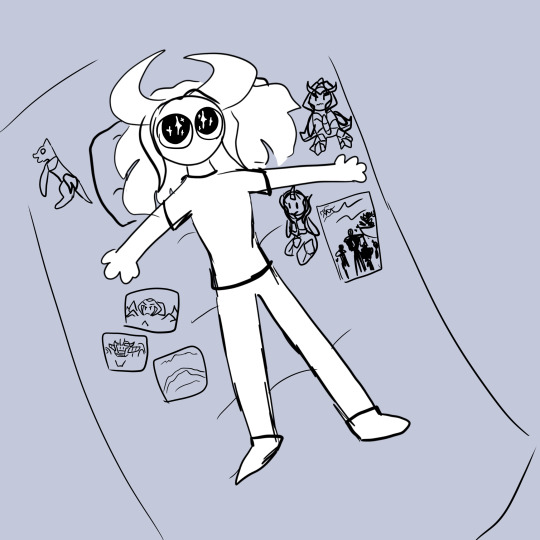
Went to my first convention a few days ago
#leaf speaks#my art#transformers#maccadam#transformers prime#TFCon 2022!#it was awesome#there was amazing cosplay#someone was walking around decked out as TFP Soundwave#I got a TFP Wheeljack#by the third hour on the first day I had 3 MEGATRONS#I HAVE A PROBLEM#oh and there were PLUSHIES#FROST AND I GOT FIVE BETWEEN THE TWO OF US#and I got writing advice from one of the TFP writers!#and MET PETER CULLEN#HOLY SHIT#HE WAS SO SWEET#AND HE TOLD GREAT STORIES TOO#it was exhausting but super fun#next time I need to remember to drink water and eat food so that I don’t nearly pass tf out when my adrenaline spikes#because I’m meeting one of my favorite voice actors lmao
35 notes
·
View notes
Note
As someone who is long-time fan of Mlp EG and who has just finished watching TFP, your fic is true delight. I read it 5 times at least and it is still awesome. You perfectly matched girls with their autobots partners just as well as you did with decepticons as their evil counterpart. For example Twilight/Shockwave - both have high inteligence, but while one uses it for greater good and to help the others, the other abuses it to gain power and hurt the others; Fluttershy/Soundwave - even thought they are both animal lovers and quiet types, FS is just very shy girl while SW is calculating sadist; Rainbow/Starscream - Apart from being queer icons (If you can look at these two without the word gay constantly entering your mind, congrats, you´re legit cishet) they´re actually pretty similliar in function and personallity wise. They´re both eccentric, aroggant showoffs and are also fastest on their team. But it´s their differences that are making them great foils. RD is impaitent hothead, who jumps straight into action without the second thought, while SC is great schemer, who has his plans planed out. RD is literally element of loyalty, while SC is mostly loyal to himself and etc. I can´t wait to see all their interactions in the future. If you´re interested in some writting advice, there is one minor thing that can be fixed : your description of characters feelings and thought. You start explaining how and why they feel that way instead of giving readers benefit of the doubt. The best term I can think of is that you are describing a picture. Like you want us to see, hear and understand everything at once. It creates unnecessary sentences or whole paragraphs without which some emotional moments would have sounded better. For example if paragraph in Ch.2 with sentence "She was too stuborn." it would have sounded so much better. Or sentences like "She was too precious." are also kind of waste of space since they don´t tell anything new.It´s not worst type of description,but it can create a feeling that you don´t trust youre readers to read from emotions characters alone. Many new writers and comic artists are often doing this. It can be solved 2 ways : by improving their writing or start drawing comics. I´m sorry if I confussed you in some way. I tried my best to explain it, but english is not my primary language. If you don´t mind, I would recommend fics from @whatwooshkai to see what I am talking about ( it´s mostly TF shipping stuff, but man, the writting is so good that I can´t stop reading even if I wanted to). Overall great story and art, just writting needs a little improvment.
I want to finish this already long post with few questions:
1.What is group dynamic with eachother? I mean in and outside of their decided pairings. I can see Sideswipe and Rainbow´s relationship as chaos siblings and that Rainbow is definitely driving Ratchet insane, but what about the others? I´m courious to know.
2.Did you already started writting the next book? If not, do you have planned when you will start?
3.Do you consider draw this as a full time comic or at least draw some parts of it? Or drawing some strips of your incorrect quotes?It´s just that you´re artstyle is so pretty and redesigns of the autobots and girls are great. It´s shame to see so little of them.
4. Did you thought about getting your comics dubbed on youtube?
5. Do you draw ideas from the asks from your followers on Tambrlane or you take commissions only? Like if they had a idea for a comic/sketch and they post it to you, would you draw it? If not, could they draw it with your redesignes?
6. What gave you idea for this crossover? My best guess is that comic from Hasbro.
Holy- I never thought I would get such a long ask.
*rolls up sleeves and rubs hands*
Okay, let’s do this!
First, I want to thank you so much for the kind words, the fact that there are people who got really interested in my fic makes my heart flutter. <3
And I really love it when readers point out small details that I haven’t thought about that much while writing! Thank you a lot for the advice and recommendations, I really appreciate it! I will keep that in mind!
Now, to answer your questions:
1. You are absolutely correct about Sideswipe and Rainbow’s relationship, in my opinion, they will be the best chaos siblings (I am 100% sure that most of the members will go insane because of their pranks) I could write more detailed headcanons for them and the others too.
2. The next book is nearly finished, I will make sure to post it at the beginning of January.
3. I will drop more art soon, promise! Sorry for the lack of content, I’ve been pretty busy for the past few months. But now I’m finally free and I will certainly start drawing again! I also have several ideas in mind for some parts of the next book.
4. I don’t mind my comics being dubbed as long as I’m credited and they’ve asked for permission.
5. Again, if I’m credited and asked for permission, there will be no problem for other artists to draw my redesigns. I don’t usually take requests and it really depends on my free time and motivation, but if I really like the idea that has been suggested, I would (probably) draw it.
6. Good guess! But actually no. I was really into this crossover way before Hasbro decided to make a comic of it. I’ve been into a lot of fandoms and reading crossover fanfics basically became like a hobby to me. I got a lot of inspiration after I accidentally stumbled upon some pretty good written Tf/Mlp fics, but it took me a lot of time to finally get enough courage and start writing my own. I’m more than thankful for the support and love that I was given through the years! It really motivated me to keep on going!
22 notes
·
View notes
Note
Hey Ween, don’t know if you’ve got an ask before about this but any tips on starting a writing blog? (I’ve been deciding on whether or not I want to write stories about my OCs and stuff in a fanfiction-type blog but I’m sort of uncertain yet)
I haven't gotten an ask about this yet, I think... And while I don't really think I have much advice to share since I'm still somewhat new to this, I'll share what I can!

SO you wanna start a writing blog?

1. Do you have the time to start one?
Do you have time in your life to put work and effort into it to keep it alive? You aren't obligated to post if you don't want to, but if you want to keep your blog active you'll need to post every now and then. If you have a LOT of stuff going on in your life, and you don't think you'll be able to maintain it, maybe start one up later on.
2. What kind of content are you gonna write?
What're you gonna write for people? Which fandoms will you write for? What kind of content will you make for people? You could write for fandoms that you enjoy. I highly suggest that you make a post containing what you'll write and what you won't do, and have it someplace where people will see it.
But if you want to write for your OCs then just go do it! I mean, who's gonna stop you, the police? If it makes you happy and doesn't hurt anyone else, just go do it!
3. "Ok I got my blog started, but how do I bring attention to myself?"
Write some stuff, and post it! Don't rely only on people's requests to make content. It might take a few days but people WILL see it. Some of those people WILL click on your blog and check it out and send you requests if they're open.
4. PLEASE TAG YOUR STUFF PROPERLY. PLEASE
Tagging your stuff properly is REALLY important. Look at how other writers tag their content. Please tag content that contains triggering or sensitive content like abuse, manipulation, death, etc.. Or if it contains NSFW. Please tag it. Not everyone wants to read that while scrolling through and looking at content. You should also utilize read-more cuts. If something interests someone, they can click on read more and keep reading. But apart from warning people on what kinds of triggering content your writing may contain, if you tag it properly it'll be seen. When you want to look up fics for Transformers: Prime, for example, what do you type into the search bar? TFP imagines? TFP headcanons? What do you think other people type into the search bar to look for content? If you don't tag your stuff properly, not many people might be able to find it.
TLDR: Tag triggering content like abuse, death, etc.. Or tag content like NSFW. NOT EVERYONE WANTS TO SEE STUFF LIKE THAT WHILE SCROLLING THROUGH. Please use read-more cuts. Also if you don't properly tag your stuff, it might not be seen by people.
I think I may have forgotten like a whole other stuff, but this is the best I could do at the moment. I hope it's helpful, and if anyone else has any other tips to add, I'd appreciate it!
2 notes
·
View notes
Text
Analysis: TFP Optimus Prime and a Discussion on Revenge
Disclaimer:
This post is going to be a long vent about my frustrations with TFP Optimus Prime, specifically with the advice he gives to Arcee and the audience in regards to revenge. So if you’re someone who does likes him or hold similar views to him, you are probably not going to like or agree with what I’ll say in this post and that’s completely ok. The whole point of this post is to provide another perspective and open discussion with me and anyone else about this (But do so respectfully, please).
Also, there are going to be spoilers for Transformers Prime in this, so skip this post for now if you don’t want the show to be spoiled for you.
So without further ado, let me explain why TFP Optimus Prime’s stance on revenge is wrong.
For those who aren’t familiar with Transformers Prime or don’t remember everything, one of the biggest subplots of the show was Arcee and the loss of her partners, Cliffjumper and Tailgate. Throughout most of Season 1 and Season 2, Arcee is on the hunt to find out who killed Cliffjumper and to get revenge for Tailgate by going after Arachnid.
Everything with this arc was going ok...until Season 1 Episode 20, Partners.
During this episode, Arcee ends up following Arachnid, much to Optimus’ distaste. After Optimus saves Arcee from Arachnid, he tells her that seeking revenge for Tailgate is a bad idea. Later on in the episode, Starscream lets slip that he was the one who killed Cliffjumper, and Arcee reacts accordingly by attacking him. She almost kills him, but is stopped when she realizes Bumblebee is watching them and she lets Starscream go. The episode ends with Arcee saying that she thought settling scores would allow her to move on but that her actions instead lead to the Autobots losing an ally. Optimus comments that wisdom is gained, not automatically earned.
This arc continues in Season 2 Episode Episode 10 Armada, where Arcee ends up trapping Arachnid in a stasis pod, ultimately ending their rivalry. The pod is taken back to base, where Ratchet says Arachnid “deserves worse”. Arcee responds that she “intended worse, more times than you know” and Optimus responds that Arcee is “stronger” for her choice.
These series of events are what ruined both Optimus as a character and Arcee’s arc for me.
Optimus tells Arcee that seeking revenge is bad and that she’s a “stronger person” for giving Arachnid a fairly merciful fate of being put in stasis. There’s one problem, though: he’s wrong. And apparently no one on the writing team knew that.
What Optimus ends up implying is that Arcee’s anger at both Arachnid and Starscream is not justified, that being mad at them for hurting her makes her a “bad person” and wanting them to suffer consequences for it is not the right path to take. Except none of that is true.
I think it’s fair to say that Arcee is victim of murder, and has a lot of trauma and emotional damage because of it. She has lost two partners that she clearly cared for and were close to, with one of them (Tailgate) dying right in front of her optics. She displays signs of depression throughout the series, and if the flashbacks in Season 1 Episode 12 Predatory are any indication, Arcee probably has a good case of PTSD too.
The thing about people who have been severely hurt and traumatized by others like this is that they need closure, and there are many ways that this can be accomplished. Forgiveness is only one way. Sometimes closure comes in the form of having the aggressors be given jail time or the death penalty. Sometimes with bullying, a victim will find peace by seeing the bully getting in trouble with the teacher and being suspended. Some find peace through therapy. Sometimes, people can only find peace by taking matters into their own hands and punishing the aggressors themselves (victims fighting back against their bullies and the story of Gary Plauche are good examples of this one). The point is that victims and their friends/family members affected by murder, rape, bullying, or any other hurtful acts is that they don’t have to forgive the ones who committed the crime, nor are they required to. In fact, many people don’t.
This is something that Optimus Prime simply doesn’t understand, and many adults don’t either.
I want you to take a quick read at these statements that people often give as solutions to bullying:
“Don’t react, just ignore them. They’ll go away.”
“Don’t fight back, that’s stooping to their level”
“Tell them to stop saying/doing those things, they’ll listen”
On the surface, all of these statements sound correct because these are all very tame, non-violent solutions. They’re all moral high ground statements. But almost any victim of bullying can tell you that none of this advice ever actually helped, and if you ever told a teacher someone was bullying you, you at best got ineffective solutions/similar advice to the above and at worst did nothing about it.
Optimus Prime’s statements about not seeking revenge come from the exact place that the above quotes come from: a place of wanting to appear moral and above-it-all but having none of the experience or knowledge to actually back it up.
Optimus wasn’t as close to Cliffjumper as Arcee was. Optimus didn’t see Tailgate’s gruesome death first-hand. He may be older, but being old doesn’t automatically make you right. And I find it ironic how Optimus states that wisdom is earned at a cost yet he’s the one who is clearly is struggling with that concept when it comes to Arcee.
It upsets me to no end how Optimus is contantly tellling Arcee that she’s the one who has to be the more moral, bigger, stronger person. But Starscream and Arachnid? You know, the ones who caused all of Arcee’s anguish to begin with? Naw. Arachnid can continue to tease Arcee by asking if she’s lost any more partners and Starscream can pretend to feel bad about killing Cliffjumper and then immediately brag about it the next day. Yeah, those two don’t need to change. ARCEE DOES. CUZ REVENGE BAD.
Remember how Arcee said she intended a worse fate for Arachnid and Optimus praises her for it? While the show treats that as “closure” and the end to that rivalry, I’m not convinced. For the longest time, Arcee wanted Arachnid dead. So for her to all of a sudden switch to being merciful to Arachnid seems off to me. And thus I began to wonder: Did Arcee decide to not kill Arachnid because she had a genuine change in morals, or did she do it in order to make Optimus Prime happy? Or in other words, is this a genuine change of character or this just the writers’ last-ditch attempt at pushing the “no revenge” narrative into the audience’s face? I don’t know for sure (although I’m pushing for latter in both questions) and the show doesn’t address this. And this is bad because depending on this answer, this could mean that this arc was never truly finished. If Arcee still didn’t believe or feel that having Arachnid in stasis was good enough closure, than the story isn’t fucking over. But no one of the writing team thought this far. No one was willing to put this kind of depth into the show.
Furthermore, I’d argue that this constant talk about Arcee being a “better person” is causing her to be critical of herself over things that aren’t really her fault or that she wouldn’t be able to predict the outcome of.
One is Arcee blaming herself for Smokescreen’s “death” in Season 2 Episode 21 Alpha/Omega. The other is Arcee regretting her attack on Starscream and losing a potential ally. But the reality is that Starscream is extremely fickle and having him join the Autobots wasn’t guaranteed to end in success to begin with. Even if Starscream did join the Autobots, there’s no promise that he would side with them forever. Almost all of his decisions are based off his own goals, and many times that can go against the ideas/goals of the group he’s in. Actually, Starscream does end up betraying the Autobot’s trust anyway in Season 2 Episode 23 Inside Job where Starscream uses the Autobots’ (ok, most Optimus Prime’s) trust to steal the Omega Keys and use them in order to gain Megatron’s favor again. Unsurprisingly, trauma victims in the real world also blame themselves for what happened to them too.
There’s many things about TFP Optimus Prime I can forgive. Boring characterization? Fine. An intriguing characterstic (lack of outward emotion) that has potential to be interesting but the writers never decided to explore it? Whatever. But I draw the line at shitty advice presented as a good lesson, especially when your audience is young kids who don’t know better and may need desperate help.
Kids get bullied and abused. Kids need to be told that fighting back against bullies and abusers who have hurt them doesn’t make them a bad person because the “lessons” and “solutions” that many schools and adults teach or tell rarely work. And telling them otherwise because it sounds right isn’t going to help. If anything, it’s only going to hurt those kids in the long run.
TL;DR Arcee is a good girl who deserves hugs and therapy, and Optimus Prime is a self-righteous moron who deserves to be thrown into a smelting pit.
39 notes
·
View notes
Text
The Lost Special?
Musings over possible implications of BBC Dracula
After obsessively watching all three episodes of BBC Dracula, I can’t help feeling I’ve got one of my suspicions, if not exactly confirmed, at least enhanced: that this Victorian old story, finally adapted into present time, might in fact be relevant to Mofftiss’ version of ACD’s short story The Lost Special. Maybe it is, maybe it isn’t, but since I can’t deny I do like ‘tin-hatting’, for now I choose to believe it is. ;)
(Continued under the cut)
As some of you guys already have expressed, I think BBC Dracula has BBC Sherlock written all over it. I believe this was obvious already from the setup; same authors, same producers, same broadcasters, same set designer, same format, three of the same actors including one of the writers, and even the same airing slot as BBC Sherlock. The Sherlock hints are sprinkled all over the two first episodes, which occur in the same Victorian time frame as ACD’s original Sherlock Holmes stories. This for example:
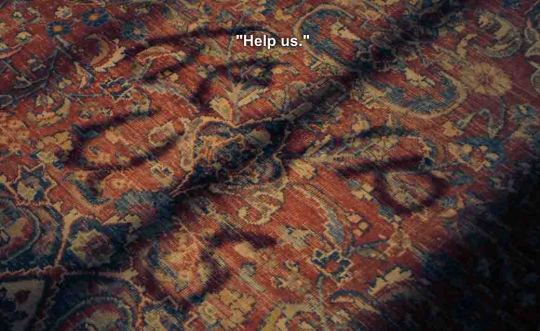
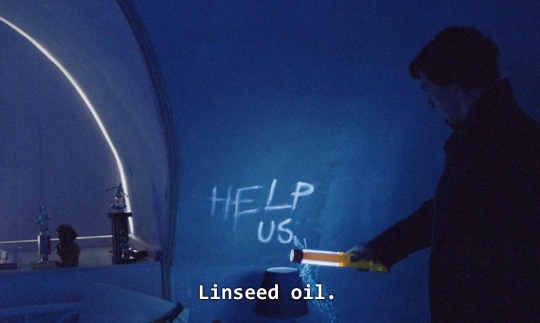
But the bringing of Bram Stoker’s old narrative into present time in the third episode (The Dark Compass) kind of sealed the deal for me.
Suddenly we have Count Dracula sending text messages by smart phone to his victims:
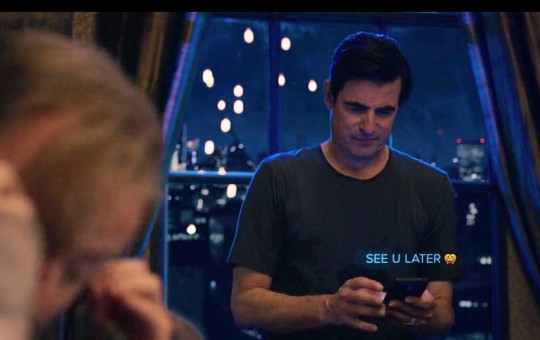
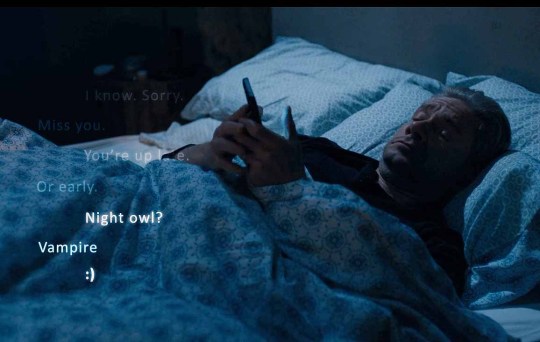
We have Dracula vomiting on the rug of a crime scene:

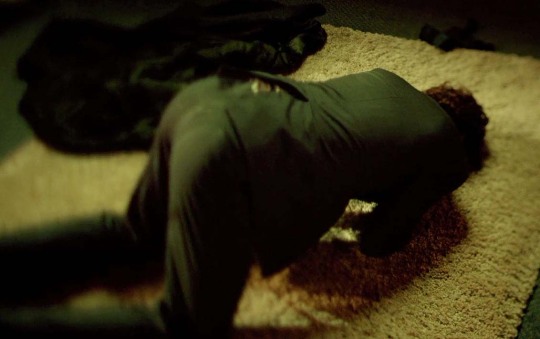
We have him storing body parts in the fridge! (X)
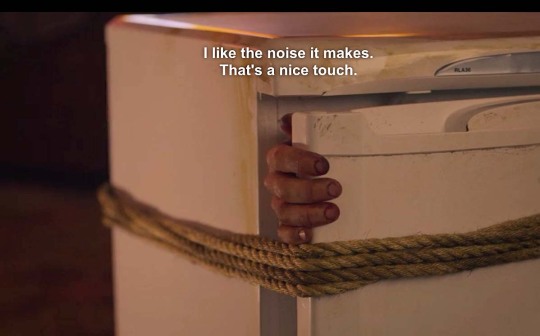
And this fridge scene is taking place while Dracula is watching a TV program with elephants on the Savannah, exclaiming “Look at her - so beautiful!”:

Who is beautiful - the ‘Elephant in the Room’? It certainly feels like Mofftiss are stringing us along here, doesn’t it? ;)) But no; it’s the sun that Dracula admires as beautiful, we learn that in the show. The shining from the sun is a thing he thought he could never endure, but ultimately he learns that he actually can.
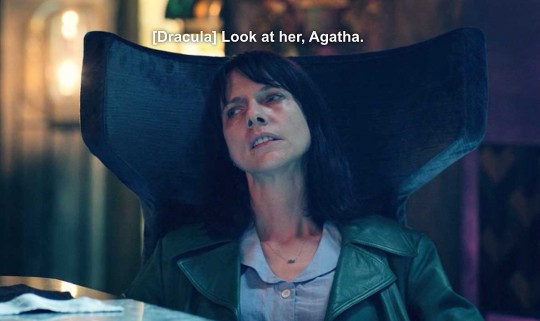
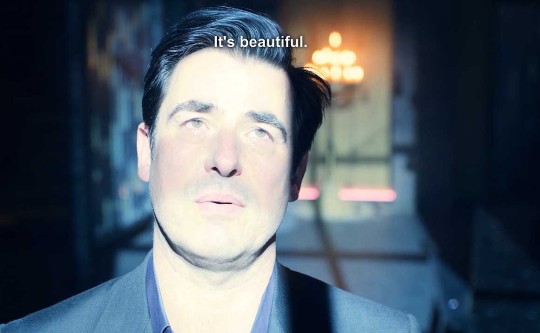
Same thing as Sherlock says about John Watson the distant suns in the sky in TGG:
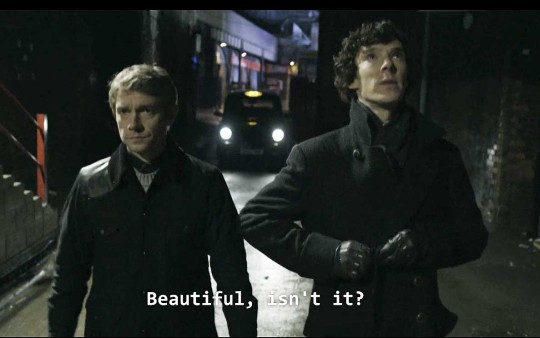
Or about Sister Sentiment’s music in TFP:
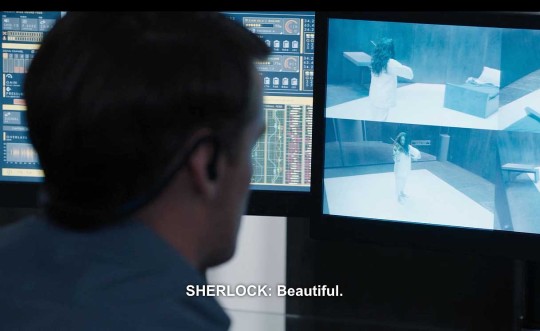
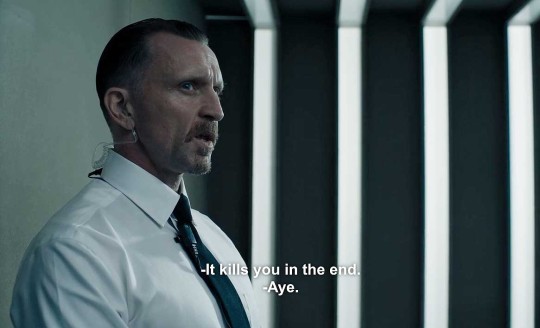
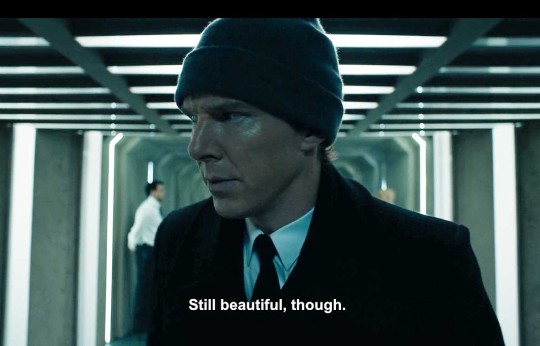
Taking Dracula to modern time is something that the authors had expressly denied they would do. But they were lying of course, as is their usual MO. Exactly the same deception as they did with TAB, isn’t it? And as if this wouldn’t be enough, there’s a whole list of other modern Sherlock references, summarized by @gosherlocked (X). I’m sure there’s more, we just need some more time to find them.
As I mentioned in this comment recently (X): The Lost Special (X) is a short story about a derailed, disappeared train that ACD wrote during the Great Hiatus (1898). It bears some typical Holmes-case mystery characteristics. And the anonymous person who in this story sends a letter to the train company, suggesting a way of solving the case, seems very much to be Holmes himself:
“It is one of the elementary principles of practical reasoning, that when the impossible has been eliminated the residuum, HOWEVER IMPROBABLE, must contain the truth. It is certain that the train left Kenyon Junction. It is certain that it did not reach Barton Moss. It is in the highest degree unlikely, but still possible, that it may have taken one of the seven available side lines. It is obviously impossible for a train to run where there are no rails, and, therefore, we may reduce our improbables to the three open lines, namely the Carnstock Iron Works, the Big Ben, and the Perseverance.”
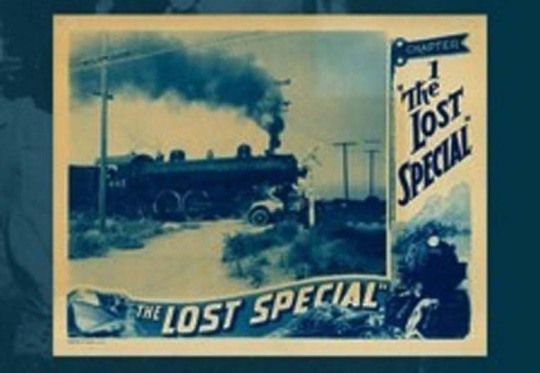
(X). So this short story indeed looks like a Holmes story in disguise. But Sherlock Holmes’ name is never mentioned in The Lost Special and the storyteller is not John Watson. In this story the police did not act on this anonymous person’s advice. The truth wasn’t revealed until one of the perpetrators - a hired murderer who was threatened with execution years later - admitted that he had participated in derailing the train in question (X): “A conspiracy of men had temporarily re-attached the side track leading to the abandoned mine Heartsease just long enough for the train to go down to the mine, then pulled the tracks back up before they could be discovered.” To the broader audience, however - the Holmes readers - the character of Sherlock Holmes remained ‘dead’.
The wrapping up
One could say that The Lost Special both had and had not a satisfactory ending. Satisfactory because the truth was finally told and the mystery thus solved, but unsatisfactory because in spite of all the hints, the readers didn’t get to know anything more from Holmes. Not until years later (1903) when ACD actually did ‘resurrect’ him and continued the narrative of Sherlock Holmes with 33 more short stories.
When Dracula finally ‘dies’ at the end of the BBC Dracula series, it’s not by being ‘staked’ or burnt to ashes with the sunlight as one would expect for a ‘monster’ like him. It’s by embracing the criticism of his most resilient but dying opponent: Zoe/Agatha Van Helsing (Mofftiss call her ‘Zagatha’ in an interview). She is dying from cancer, not from vampire bites. Dracula drinks her (to him) mortal blood and then ‘dies’ in her arms, basking in the sunlight (without burning) in a tender lovers’ embrace.
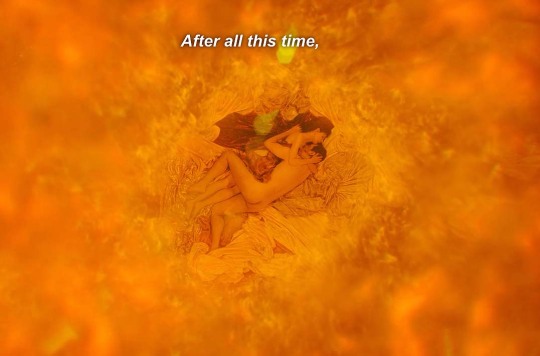
Zagatha in BBC Dracula is criticizing the vampire for skulking in the shadows, being afraid of facing death. She says it will be his punishment to live on for eternity, while she is mortal and dying:
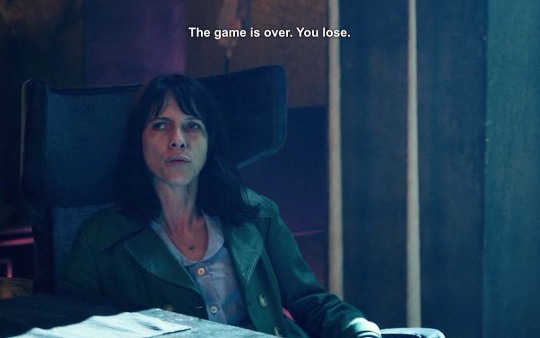
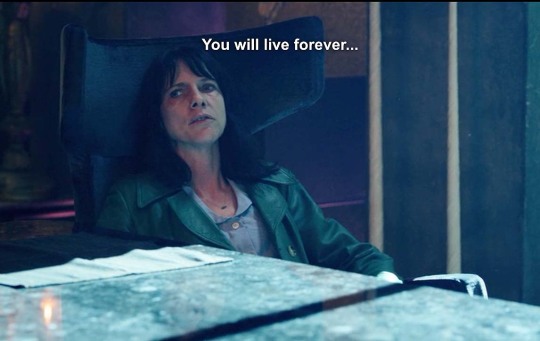
Seriously, this is so much ‘Buffy the Vampire Slayer that I can’t just... But Count Dracula re-writes Bram Stoker’s original story and opts for another solution: to ‘die’ willingly in the sunlight, together with Zagatha. And if dying is a metaphor for falling in love - as I believe it is in BBC Sherlock - this might have some important implications. I think Dracula and Zagatha here represent two sides of Sherlock that are finally allowed to merge; his Sentiment and his (Homo)sexuality.
Like The Lost Special, BBC Dracula is nicely wrapped up and ‘solved’. But we still don’t really know what happened with Count Dracula, because we don’t actually see him crumble into ashes like he did in Stoker’s canon, and like the other vampire who was ‘staked’ in the show - Lucy Westenra. But the episode is packed with Sherlock references, so...
But I can’t say for the life of me that S4 of BBC Sherlock brought a satisfactory ending for the Holmes narrative either; it’s not ‘wrapped up’ at all! John and Sherlock seem to live on for eternity as ‘best friends’, solving crimes in the heteronormative ‘legends’ preferred by Ghost!Mary’s voiceover. They are simply immortal, Un-Dead for ever - like a punishment? Wouldn’t it be far more satisfying if Sherlock Holmes and John Watson’s characters would come out and appear ‘human’ and ‘mortal’ and not have to remain just ‘best friends’ forever?
The (lack of) train references
One might argue, of course, that there are no specific train references in BBC Dracula, so how could we think it has anything to do with The Lost Special? Because, like The Lost Special, BBC Dracula is a Sherlock story in disguise! And because in the BBC Sherlock narrative itself there are already several episodes with train references; the most prominent of them is TEH and the last one - TFP. So there’s really no need for more references. But the train theme isn’t explained; it’s not ‘wrapped up’ at all, and neither is Sherlock’s story. I’ve tried to argue before that the detective is actually dying in S4, and so have others (X). And making him immortal will not save his credibility as a human.
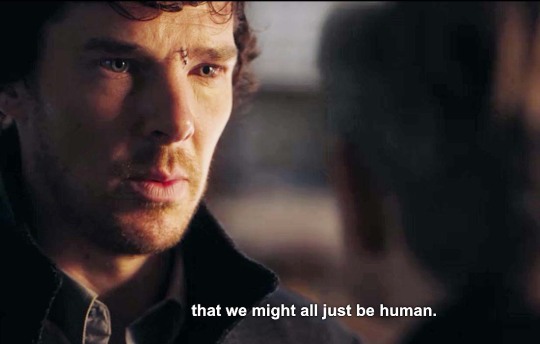
I do hope he’ll wake up again, though - preferably with help of modern medicine rather than superstition - to a more credible and realistic story than both TFP and Dracula. ;)
In TEH, apart from scenes with John Watson traveling alone through the Underground network of London, we have a derailed Underground train carriage near Sumatra road, where no-one would care to look. Like a Lost Special. It’s not carrying a bomb; the whole carriage is the bomb, which is threatening to overthrow the Parliament. Which very much makes me think that Mofftiss still have a metaphoric ‘bomb’ stored for us, a ‘rug-pull’ of sorts. But John and Sherlock (and the world) were not ready in TEH, so they switched it off. The ‘bomb’ never went off in S3 (2014). In TEH John was urging Sherlock to ”use your Mind Palace” to defuse the bomb, and I think he did - for the rest of the show up until TFP. Because in TEH, Instead of the big explosion, we got a truly weird, staged scene with Anderson (who didn’t quite believe Sherlock’s explanation anyway).
And then the plot carried on in its heteronormative tracks with John’s wedding and Mary taking over the narrative. But in TST we learned that Sherlock, as a child, had re-written an old tale about someone encountering Death in ‘Samarra’ into a story where the hero ends up in Sumatra instead, and lives. In TFP the plot derailed completely into an absurd horror story, and we got Moriarty as train driver, going “Choo-choo!” like a train whistle:
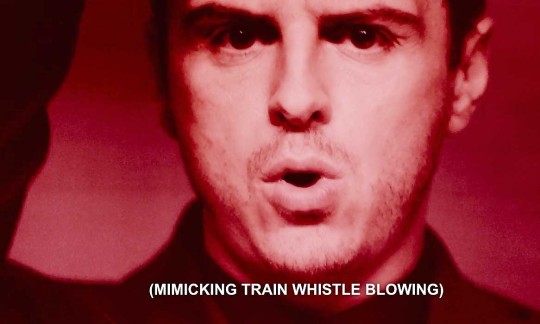
But the only 'explanation’ related to trains that we learn about Moriarty in TFP is rather lame: that Jim’s brother supposedly was a station master (not from canon, though). And then he goes “tick-tock, tick-tock” like a ticking bomb:
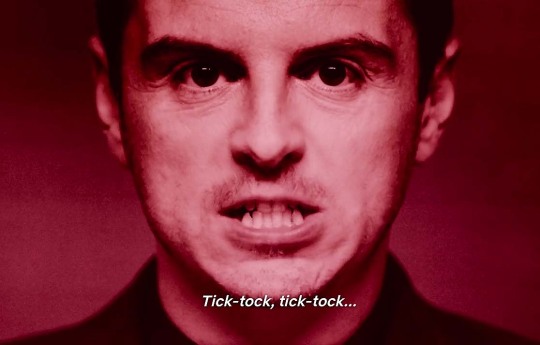
(Also similar to Mycroft’s ‘tick-tock’ countdown until he’ll die from obesity in TAB). But no bomb went off at that point in TFP either (I’m not counting the Patience Grenade here, because that happened before the ‘tick-tock’). So what was all that tick-tocking about? And how long will it keep ticking asdf?
The Sussex Vampire etc.
After reading some interesting metas from @yeah-oh-shit (X, X) and @ebaeschnbliah (X) I feel more and more convinced that legal issues with the ACD Estate might be very relevant for what Mofftiss are doing with BBC Sherlock and BBC Dracula. Three important ACD stories have now entered the public domain on January 1st this year: The Sussex Vampire (SUSS), The Illustrious Client (ILLU, where Holmes and Watson visit a turkish bath ;) ) and The Three Garridebs (3GAR; known for a scene where Holmes shows a glimpse of his true feelings for Watson). in SUSS there’s a quote about Sumatra which I find really interesting in the context described above:
“Matilda Briggs was not the name of a young woman, Watson,” said Holmes in a reminiscent voice. “It was a ship which is associated with the giant rat of Sumatra, a story for which the world is not yet prepared.
As I said in this comment (X), there’s a lot of subtext to draw from this. And I do hope the world is prepared now. ;)
@raggedyblue @ebaeschnbliah @gosherlocked
79 notes
·
View notes
Text
Sherlock S4 is a DYSTOPIA
A terrible reality that isn’t technically “real”, but which represents an undesirable, regressive future. Like a simulation, you could say. Or a nightmare. I have actual truck loads of evidence for this. There’s lots more to come in future parts. For now, I will share why I am very convinced that Moftiss have covertly inserted a dystopian tale into the 4th act of this five-act series. It would explain the extremely confusing (opposite, in fact) characterization (like John), Mary’s redemption, and the removal of the romance and chemistry from the show. A nightmare. Possibly our nightmare more than Sherlock’s.
It seemed like they were telling a different story because they were telling a different story, a “What if?”. What if heteronormativity and homophobia won? What if not only the love story failed to come to fruition, but the love story never even existed.
I hear you asking already; what would be the point of that? I came across this:
“Many novels combine both [utopia and dystopia], often as a metaphor for the different directions humanity can take, depending on its choices, ending up with one of two possible futures.” x
Without yet having the final and fifth act to give the fourth series meaning, it makes one hell of a stressful puzzle to be left with for a hiatus. It’s a puzzle, because it’s a dystopia that’s missing it’s counterpart, the utopia.
Continued under the cut.
For me, this feels like every little thread coming together. Because DIRECTION, and CHOICE, like in the quote above, are themes that have been in Sherlock since the beginning.
Even the cab chase scene in ASiP has a major “direction” theme to it with the “no left turn” signs, Sherlock running right and John running left, then John’s little “sorry” as he switches direction to catch up. This little spinny arrow reminiscent of a compass features as a very quick shot in the ASiP chase, one of many direction-themed images in the scene.
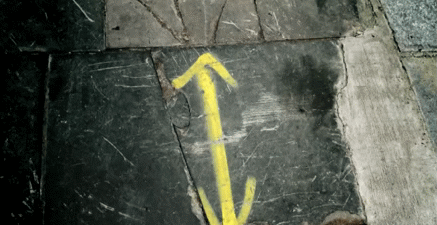
And then there’s the lovely Moffat word-play in HLV where John says “your way” when “way” also means “direction”, in a scene where John is standing at the centre axis between Sherlock and Mary like they represent his two directions/choices.
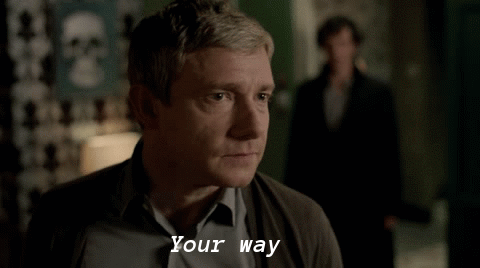
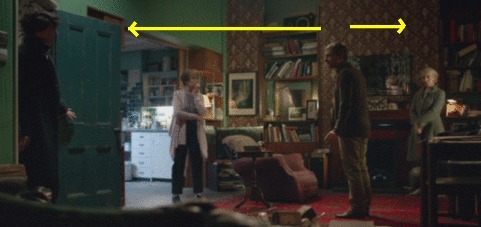
There are lots of examples of CHOICE, but two big ones are the pills in ASiP, and then Sherlock needing to choose between Mycroft and John in TFP. The theme has been noticed by many, and is always a choice between two things, two things that ultimately seem to stand in for life and death like the pills did.
“Many novels combine both [utopia and dystopia], often as a metaphor for the different directions humanity can take, depending on its choices, ending up with one of two possible futures.”
A choice was the climax of the plot of the first episode, and then it happened again very prominently in the last episode. And thanks to the predictive power of a parallel which is the basis of so much of what we do, you can absolutely guarantee that Sherlock’s choice between John and Mycroft in TFP, even though on the surface level it was about who was more useful to Sherlock, was as much about Sherlock’s own life or death as his choice of bottles in ASiP was.
Two possible futures, like a good bottle (good future) and a bad bottle (bad future). Which one comes to pass depends on your choice.
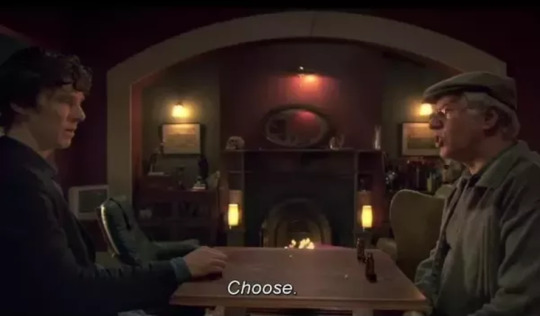
We find threads of symbolism that fit beautifully into the romance, but we fail to see beyond Sherlock and John’s story to how those two are just an example (albeit, a very important one) of a larger story of the struggle for freedom from oppression. As Sherlock said; “Make no mistake, this is war”. This is so important, because without the context of the sociopolitical allegory that’s very much there, you probably wouldn’t believe me if I suggested that “forwards or backwards” stands in for “the different directions humanity can take”

As I began yelling about a year ago, Molly’s advice after Sherlock was shot in His Last Vow is significant because:
‘Forwards or backwards’ is code for the progression versus regression of society
I hear your skeptical thoughts. Which is why I am absolutely elated to be able to share that Moffat’s little word-play metaphor in Molly’s dialogue was “confirmed”, you might say, in Moffat’s Doctor Who this year:
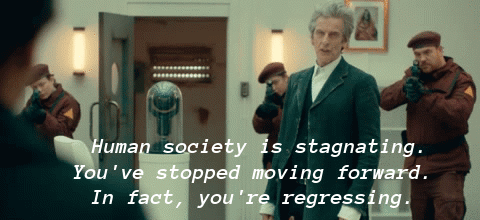
And now we’ve been given an undesirable, regressive series, after Sherlock fell backwards in His Last Vow, in a scene where an awful lot of drama seemed to surround his decision as to which way he fell, and it meant his life or death.
[Side note: In fact, the regression to a more heteronormative and homophobic false reality began immediately after Sherlock’s decision to fall backwards - Janine’s newspaper articles, John forgiving Mary at Christmas, John not understanding anything at Appledore when we know he’s pretty damn smart, John not stopping Sherlock from pulling his gun out of his coat pocket, John not doing everything in his power to save Sherlock as he flew off to his death at the Tarmac. The romance was already gone. The only decent explanation back then, was that John was faking all of that to plot against Mary. But really, John had already been replaced by his dystopian twin, the one who never loved Sherlock that way.]
Going further back to an older Moffat Doctor Who episode, Blink, we get a bit more context. I get the impression that Moffat got more subtle (or careful) in his later Doctor Who seasons, but back in Blink in 2007 he included this hilarious and very telling dialogue about his own word choice, like Captain Subtext was in the room.
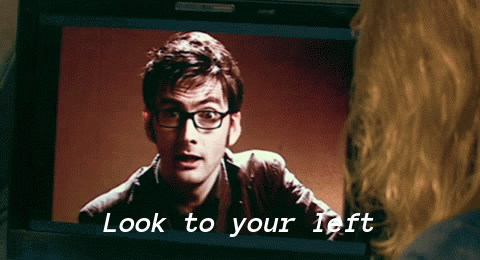


I absolutely have to put this gif of John here for you again, because note that John turns his head to his left where Sherlock is as he says “your way” (way = direction) like the Doctor’s little head movement in the gif above, and like Sally in the gif above looks up from the computer and over at Larry to her left, who (spoilers) she ends up together with at the end of the episode. It’s subtle. Infuriatingly subtle.

Direction has a political subtext. ‘Left and right’ is left-wing versus right-wing politics. The progression versus regression of society. Left and right is less subtle, which is maybe why it hasn’t been used again as blatantly as it was in the cabbie chase scene in ASiP that featured, among other things, the ‘alternative route’ being to the left...
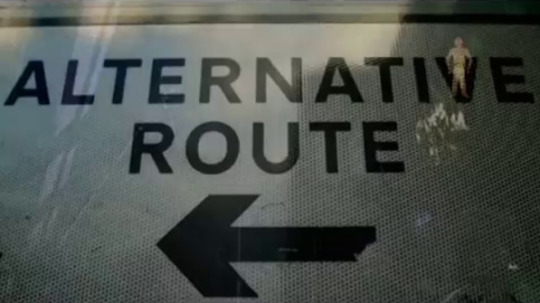
So much wordplay. ‘Alternative’ meaning another possibility or choice, and ‘alternative’ meaning departing from or challenging traditional norms.
(The signs in the cabbie chase need a whole meta, because if you go and check up on my claims here, you’ll find *no left turn* and *end of the road* which tell their own little story about S4 I think)
We do see left and right incorporated again more subtly as the show goes on. If I can borrow this great gif, we see a hint to which direction Sherlock should be going in the beautiful cinematography of the tarmac scene, where the nose of the jet looms behind Sherlock threatening to push him forwards, to the left, into John.

Moffat’s subtext and wordplay is used in a BARELY-THERE level of subtlety in Sherlock compared to being OFFERED UP ON A PLATTER in Doctor Who.
If I can just present a tiny example of what I mean by that before we move on...
Exhibit A:
One of the examples in Sherlock S4 of characters looking through the “fourth wall” (into the camera), likely as an acknowledgement of the audience and their part in the story. John raises his glass to the audience:
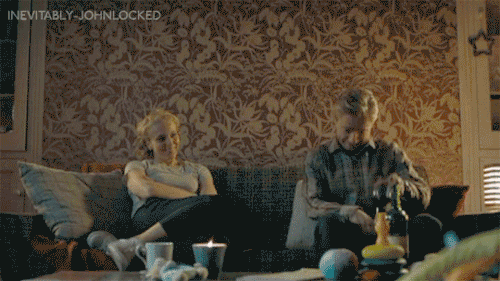
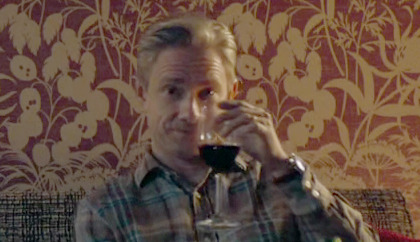
(thank you @inevitably-johnlocked)
Exhibit B:
The same thing, except in Doctor Who:
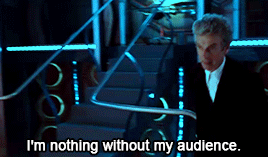
(He actually says “an audience” but thank you lovely gif maker)
That’s not behind the scenes. That’s a clip of actual show, the Doctor emphasizing a very quick deliberate glance into the camera in an otherwise normally acted scene.
You might need a moment to recover from that. I certainly did.
And then there’s the context, the rest of the dialogue from that moment (the episode is Heaven Sent):
I am falling, Clara. I'm dying. And I am going to explain to you how I survived. I can't wait to hear what I say. I'm nothing without an audience.
BBC Sherlock owes it’s success in no small part to the S2 audience that were lured in to the puzzle of how Sherlock survived the fall. So all in all, a fairly obvious Sherlock reference right there in that Doctor Who dialogue, and I think I’ve also made my point about how Doctor Who is less subtle, to say the least.
So. What is “Left or Right” in Doctor Who becomes “Forwards or Backwards” in Sherlock (more subtle, more necessary for a top secret gay conspiracy).
Moving on, let’s not forget that little Clue tagline promo for S4 that hinted at an alternate ending.

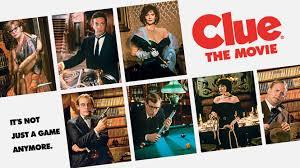
Clue (1985) featured three alternate endings and shares an almost identical tagline with Sherlock S4. We ASSUMED the alternate ending would appear around the airdate of TFP. But what if the entirety of series 5 is that alternate ending.
This is my main point, thank you for reading:
Series 5 would comprise the utopia that follows the dystopia, as a metaphor for the consequences of our choices.
Backwards for S4. Then forwards for S5.
....code named... Back 4 ??
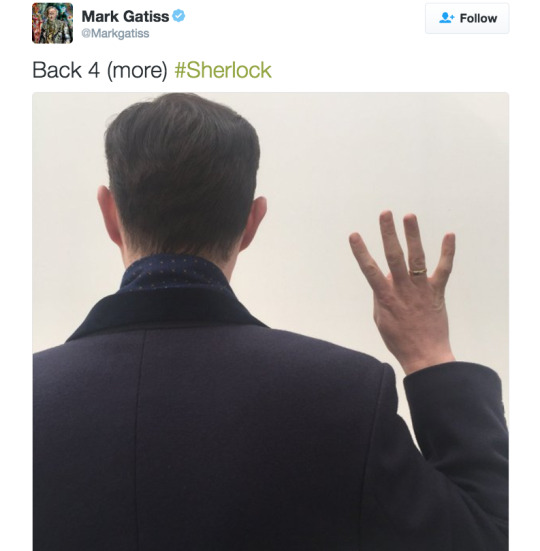
“A dystopia is an unpleasant (typically repressive) society, often propagandized as being utopian...” “.... dystopian works depict a negative view of the way the world is supposedly going in order to provide urgent propaganda for a change in direction” x
If this is indeed a dystopia, let’s break down that definition and see how well it fits series 4:
“An unpleasant, typically repressive society”
The writers’ view of “unpleasant” and “repressive” is the same as ours. In Moftiss’s dystopia, gay romance is censored and the pure wholesome friendship is reinstated. The villain who killed the gay protagonist is redeemed, glorified, and allowed to write and narrate the “ending” for Sherlock and John. Series 4 as a secret dystopia means that the meaning of series 4 will be visible once the entire 5-act story is finished.
“Often propagandized as being utopian”
We were asked to believe that S4 was real, that the outcome we were given is the joyous ending envisioned for the characters. Propagandized, by the show itself, by the writers, by the cast, as being utopian. Hence the demolishing of that fourth wall - it sure as fuck is not a game anymore. Series 4 would have us believe that it’s always been this way, and WE were reading it wrong all along.
These gifs below are from the same 2017 Doctor Who episode as I mentioned earlier, where a dystopia was propagandized as being utopia. Here, “the Monks” are the oppressive invaders who brainwashed the world into thinking they had always been there when in reality they arrived only 6 months before. Nardole dons the Captain Subtext hat and explains the themes here that people miss:
However bad a situation is, if people think that's how it's always been, they'll put up with it.
This woman is one of few who can’t be tricked though, and who fights against “the Monks”. She’s us.
As she’s being arrested, she’s told:
“You are charged with the manufacture and possession of propaganda intended to undermine the True History. This is in contravention of the Memory Crimes Act of 1975.”
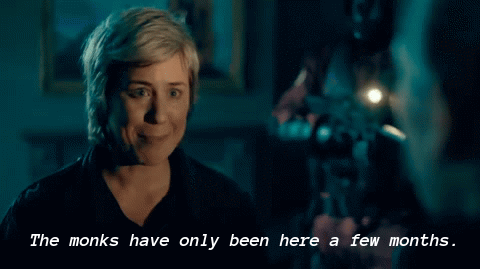
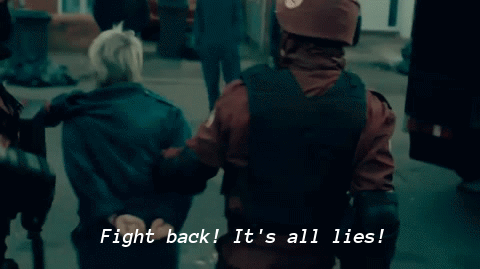
(Note the “Memory Police” reference to Nineteen Eighty-Four, the famous dystopian novel by George Orwell)
This episode needs a whole meta. Hence why I said there will be more instalments to this theory. The woman above “manufactured propaganda” to fight back against the lies. Umm. That’s....us again, I think.
“Dystopian works depict a negative view of the way the world is going to provide a sense of urgency for a change in direction”
By it’s very nature, dystopian fiction has a BIG something in common with Epic Theatre; they both aim to be a force of change.
“Many works combine elements of both utopias and dystopias. Typically, an observer from our world will journey to another place or time and see one society the author considers ideal, and another representing the worst possible outcome. The point is usually that the choices we make now may lead to a better or worse potential future world” x
Dystopia Theory fits with the mirrorverse idea; two alternate universes that are opposites. Mirror images. Utopia versus dystopia, up and down, left and right, good pill and bad pill, backwards and forwards.

The two alternate universes represent the consequences of our choices. Society’s choices, the government’s choices, yes, but also one individual and their choices. I think a large part of the subtext here, where Sherlock is the one to decide which direction we go in despite the forces working against him, is a statement about one ordinary person taking a stand, for the sake of their own liberation, as much as for society’s, and possibly winning both anyway.
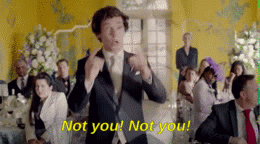

After much research (ie. watching Doctor Who), I’ve found that what this ‘choice’ subtext boils down to (at least some of the time - there are more types of choice I’ve noticed) is...
...apathy versus a fight.
In a future part I’ll go further into this idea, but for now, here is one example of where the dichotomy of ‘apathy versus fight’ can be found:
In The Lying Detective it is alluded to in the sequence of events of Sherlock’s near-death, where it appears as if he’s going to “lie down to die” in Smith’s lair (representing apathy) versus what he ends up doing, which is first swapping out the IV, then trying to fight Culverton off. Sherlock’s realization, so close to the end, that he doesn’t in fact want to die, also represents his decision that life, and what life has to offer, is worth the fight.
[The theme of apathy versus fight is seen also in the reference to Buridan’s Ass in TFP, the choice paradox (thank you @tendergingergirl). Read the meta there for the full story, but short version; the donkey does nothing (apathy), and dies.]
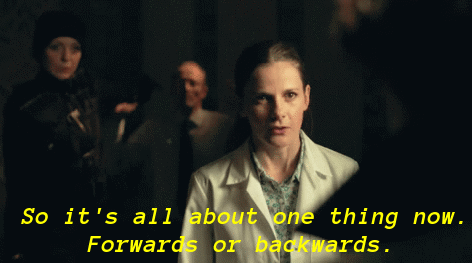
I think there is quite the weight to Molly’s dialogue here when she says “it’s all about one thing now”. In other words; the remainder of the show is all about one thing; series four (backwards), and series five (forwards).
Dystopias often feature the end of the world.
This gif below is from a different Doctor Who episode featuring another actual surface-level plot of a dystopian parallel universe:
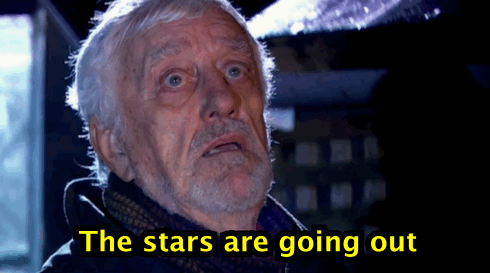
Then there was a lights-going-out theme in Sherlock series four. Keep in mind here the subtlety I pointed out earlier, less subtlety in Doctor Who, more in Sherlock.
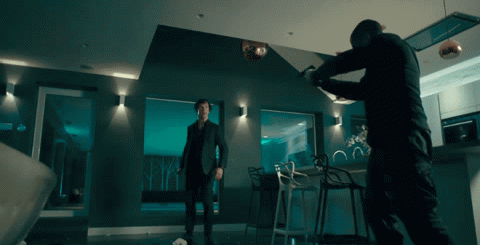
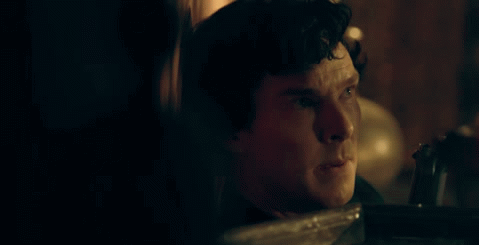
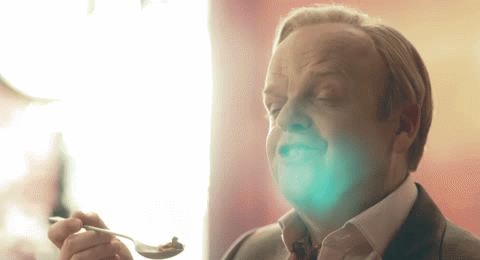
And this tweet from Mark in 2014, 6 months (!) after January 1st 2014 when TEH aired.

And speaking of Mark, he tweeted something VERY suspicious in January, days after TFP aired. At the time I KNEW this was about Sherlock, but I didn’t yet know quite how or why. He got away with it mostly because it was very clearly referring to the political end-of-the-world that was unfolding at the time. But Mark does love his double, triple, meanings.

There are some seriously geeky things to read into this one sentence, if I may:
Dystopian fiction sort of blurs with it’s cousin, the alternative history novel. Also known as a counter-factual. Where dystopian fiction warns about things that haven’t happened but might, a counter-factual is where a real historical event is altered, and the author examines how the world would have been different as a result. For example, what if Napoleon had won the Battle of Waterloo?
If we do go back to His Last Vow where the alternate universes begin as I’ve suggested in this meta, then something interesting will happen. In terms of narrative, S4 would still have been a dystopia, a future that might have happened but didn’t, an aborted time line that was snuffed out of existence. But in terms of our reality, series 4 being a part of our history that exists whether we like it or not, a retelling of His Last Vow onwards would more closely resemble a counter-factual for it’s audience in the real world. An alternative history. What could series 4 have looked like, if things had gone differently?
So I’m saying that Mark has used the term “counter-factual” here firstly to avoid using the more suspicion-inducing phrase “alternative history”, which might make our brains ping and think of the “Alternatively” at the beginning of TAB, and secondly, to play on the idea that history, time, can be rewritten (if you’re a writer), an idea heard in Doctor Who once or twice:
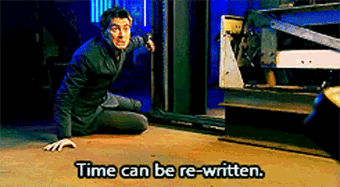



Bit of a theme, you get the gist. History can’t be rewritten in real life, but stories can. Mark’s tweet has more 4th-wall-breaking references for the pile but also a call to action. Because calling S5 a counter-factual novel reminds us that S4 exists, and can be symbolically snuffed out, but not literally.
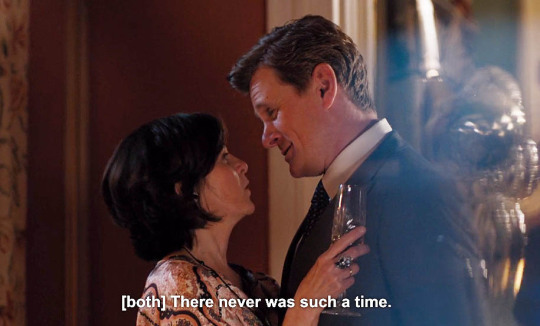
Then there’s Mark’s use of “sci-fi”in this tweet. Quite often, dystopian fiction overlaps with sci-fi, but is quite flexible and sometimes fluid in genre. Margaret Atwood called dystopian fiction a kind of “no martians science-fiction about things that might actually happen” x.
Mark could be referencing the idea that the writers are skirting a fine line between sci-fi and general fiction, with their use of parallel universes and what Sherlock is about to pull-off, which is unavoidably akin to time travel. There’s your Wholock crossover if you wanted it, which I didn’t.
And if you weren’t sure about the utopia being guaranteed to follow the dystopia, hopefully Mark’s “where everything turns out fine” will convince you. Also, if the truth in this tweet goes that far, then he was perhaps secretly assuring us that he had started writing or planning series 5 days after series four finished airing.
WHAT MIGHT HAPPEN NEXT
Because dystopias are typically set in the future, it could mean that the ‘real’ narrative is paused before the dystopia began in His Last Vow, as if time were standing still while the future simulation plays out to it’s ending.
I believe....theorize....that the very next thing we will see is a snap back to reality, “reality” being some point on the day that Sherlock was shot in HLV. At which point we will switch to the “utopian” parallel universe, which will then become purely a symbolic utopia, not a simulation. Because it will become reality, Sherlock and John’s reality. It becomes our show’s textual future, because what determines that future is their choices, and Sherlock and John are being handed the miraculous opportunity to rewrite their own lives; to go back and do it again. If you believe this theory, that is. Thanks for reading xx.
MORE TO COME
The next part will be about Time Standing Still in His Last Vow. Then there is maybe another thing or two to write. Or more. Feel free to come and poke me if I take too long, or if I’ve made a mistake here or failed to link to something or other. I’m tired. Goodnight!
570 notes
·
View notes
Text
Part Two of the List of Sherlolly Prompts as of 2/17/2017 - Two days late, but we’ve got a new one!
As of 12/5/2017 the Prompt List has been split into two parts due to size.
Here is a link to the very informal Sherlolly Prompt Fest FAQ
Below is the list of prompts submitted to @holidaysat221b. Where possible, we have tagged the submitter so that credit can be given if a prompt inspires someone to write a fic or create a piece of art.
Some submissions were specifically labeled as Art prompts, and they have been separated into their own category. However, if you are a fic writer and one of the art prompts calls to you, go for it. Likewise, if one of the other prompts makes you want to draw, have fun with it! Prompts that have been filled at least once will be followed with an *, in case that influences your decision to work with one.
We only ask three things:
1) If you use one of the prompts on this list, please remember to credit the prompt and prompter somewhere in your fic summary/art description or in your notes. It’s the polite thing to do.
2) Please submit an ask or message @holidaysat221b with a link to your work, the prompt you used, the prompter, and how you want to be identified (in cases where your Tumblr and fic/artist name are different). This will allow us to share your work with our followers and tag the prompter (if possible).
3) We have set up a Sherlolly Prompt Fest Collection on Ao3. If you are planning to post your fic or art on Ao3 and would like to add it to the collection, please do. As of this moment, the collection is open and unmoderated. Please remember to credit the prompt and prompter in your fic/art notes.
On to the Prompts as of February 17, 2017
Everything Else
Sherlock is undercover. He’s renting a small place and he’s trying to fit in with the extremely old fashioned community that is probably hiding a deadly smuggling ring or something equally bad. He ends up calling on Molly to come help. Since he’s already established as an unmarried man, his ‘sister’ (or other family member) arrives for a visit. Cue living in the same house while hot for each other type shenanigans while pretending to be siblings under the watchful eye of some suspicious townspeople. - Anonymous
Molly’s school reunion – Sherlock assumes he’ll be needed to help Molly show everyone up. The catch: Molly’s been a beloved peer, so it’s him who gets the obligatory “you hurt her, we’ll end you". :) - @mychakk
Sherlock sees a woman on the street. Instantly intrigued (you can choose as to why) he follows her. - @mel-loves-all
Molly loves wearing Sherlock’s house robes. - @mel-loves-all
Molly has a piece of body piercing jewelry or a tattoo located somewhere that surprises and titillates Sherlock. - @mel-loves-all *
Whenever Molly is close, Sherlock unconsciously always seems to need to touch her in some way after they start dating. He doesn’t notice it, but Molly does. - @mel-loves-all
A midnight dance. - @mel-loves-all
John tries to set up Sherlock with a girl. Unsurprisingly, there are a lot of contenders. And what does Molly have to say about that? - The Silent Fangirl
Through unexpected circumstances, Sherlock and Molly get engaged. It doesn’t end well. Crack!fic - The Silent Fangirl
Eurus Holmes ships the Sherlolly. So does John and Mycroft. Soon, everyone gets dragged into the Sherlolly craze. Crack!fic - The Silent Fangirl
Molly lives in the flat across from 221B. You know, the one that exploded? Yeah. But before that, there was a) looking at the hot naked guy in the window b) said hot naked guy crashing into her flat because he just wants to c) her traitorous cat crossing the street to hot naked guy’s flat. - The Silent Fangirl
Molly stops being Sherlock’s pathologist, and starts being THE Pathologist. BAMF!Molly - The Silent Fangirl
This, Sherlock thinks through the haze of cocaine, truly is the worst form of torture. Mycroft and Molly’s wedding through Sherlock’s drug-addled POV. - The Silent Fangirl
Molly commits suicide, but only Sherlock thinks she didn’t. He may not be wrong. - The Silent Fangirl
When John Watson dies, Rosie is given into the care of her godparents. Problem is, they aren’t exactly on speaking terms. Bonus for Harry Watson appearance! - The Silent Fangirl
Molly nearly gets hit by a speeding car … until Sherlock pushes her out of the way and gets hit himself. H/C - The Silent Fangirl
Molly in labor. After watching Mary in labor in TST, I kinda wanna see a funny take on Molly giving birth to her and Sherlock’s child. Maybe something like Molly being in pain, she wishes out loud she’d never had sex with Sherlock, while Sherlock logically points out how well they emotionally and biologically fit together. - Anonymous
Fluff. Molly has been hospitalized for whatever reason. She decides that she is feeling better and just wants to go home. However, the hospital does not want to release her yet. So Molly decides to leave AMA (against medical advice). She feels she can recover at home just as well and also she is eager to get back to work. Besides, who is going to know? This is something someone might expect from Sherlock, but not Molly. How long before he finds out? What is his reaction? - @shadowyqueenbeard
Angst. Molly discovers she is pregnant and is not happy about it. Although she would love to have a baby at some point, right now is not the time. She and Sherlock do not have a commitment and her career is going well. She plans to terminate the pregnancy. Sherlock finds out and tries to stop her. He please with her to change her mind, marry him and be a family. Is this just a control tactic or does he really love her? - @shadowyqueenbeard *
Molly discovers there is Sherlock Holmes RPF (Real Person Fiction) on the internet. She’s shocked to find that someone called Sherlolly4vr74 has been writing fic about her and Sherlock, and they seem to have a dedicated fan base. Some of the stories are very sweet and romantic, some of them are hot enough to give her NSFW ideas. Who is Sherlolly4vr74 (Is it Anderson? Mrs Hudson? Mary? John? I bet it’s John.) and is Sherlock aware of the stories? - @darnedchild *
Eurus has been known to put on a persona and disguise to get close to people for information – she was Faith for Sherlock, E and the psychiatrist for John. What if she had also spent some time around Molly prior to the events at Sherrinford? What information would she have gleaned about her brother and his pathologist? - @darnedchild
Can they be R rated. Because I feel Sherlock would not muck about, with telling Molly what he would like to do to her, he would not use cute little names for all her female parts and would go into great detail, like all his cases. She would be his very serious case. Yes he would most defiantly do a lot of research on pleasing her. Write it however you are most comfortable with. - @oliverfel4
Sherlock and Molly are getting married! It’s time to work on the guest list for the wedding, and suddenly they are faced with the question—Do they let Euros come, or not? - @celticmoonbeam
Shipwrecked Sherlolly—Sherlock saves Molly from drowning. - Anonymous
Euros leads Sherlock to believe that he failed, and Molly was killed after the ILY scene. Much angst ensues as he blames himself for her loss … but then we get to see the happy reunion scene when he learns she’s alive. - Anonymous
Moriarty trying to up Sherlock by sleeping with Molly, but the joke is on him, as Sherlock and Molly knew each other from secondary school/uni and were each other’s firsts. They can be regular (exclusive) lovers too. - @mychakk
Mary as matchmaker. At John and Mary’s wedding, Mary feels a little sad when they leave him alone to go dance (“What about you?”). She decides to make it her mission to help Sherlock find a girl so he’s not alone anymore. And this former agent has no trouble figuring out the potential between Sherlock and a certain Molly Hooper … (Up to you whether or not you want to throw in a Janine segue before she decides to set him up with Molly. And feel free to cover Sherlock being shot!) - @celticmoonbeam
Molly discovers she’s pregnant with Sherlock’s child at the worst possible time: while she’s with his parents, being hidden away, and the two are pretending to be just friends. Bonus if they figure it out before they’re told! - @penaltywaltz
After the events of TFP, Molly and Sherlock get closer. Suddenly, though, he pulls away and starts flirting with a coworker of hers, sometimes blatantly in front of her. It isn’t until an event at Barts that the truth comes out that it was all for a case. - @penaltywaltz
Molly finds out that as a child Sherlock liked the book “The Westing Game” and for one of his birthdays she arranges a vacation mimicking the plot of the book, even if none of them really fit the particular characters. - @penaltywaltz
Sherlock wants to make a gourmet meal for Molly for a special occasion, but he doesn’t seem to get it quite right. Fortunately, a friend/relative is willing to help. - @penaltywaltz
Sherlock moves in with Molly and begins perusing her book collection, picking up random books that have interesting looking covers, and the next thing Molly knows he’s turned into a fantasy buff. - @penaltywaltz *
Non-established Sherlolly. Sherlock gets a hold of Molly’s phone one afternoon and can’t resist snooping. He’s surprised to see a folder in her photo gallery marked “Special” and it’s all photos of him. - @penaltywaltz
Have you had sex? – After Euros asked that I somehow thought “Molly??” (as Sherlock says, Irene only texts him, he doesn’t reply). Later it seems that Euros is the only one who ever has noticed that Molly causes some emotions in him. So my theory is that something happened between Molly and Sherlock, it happened pretty recently, somehow (stressful night and they talked or they had some drinks and somehow one thing led to another) they ended up having sex; but Sherlock wasn’t good at dealing with it after or something urgent came along and he didn’t really consider Molly’s emotions, he ran off right after or in the morning, and that could be the reason why Molly didn’t pick up the phone first and was in a bad mood during the “ILY scene”. What happened between them recently is the reason why Molly is a bit rude to Sherlock when he calls, and the reason why she gets so emotional and raw so easily over the I Love You thing, and why she so easily tells him to say it first. Well, then when Sherlock says “I love you” he finally realizes fully that he really does love her too, and that he is capable of loving that way, and finally sees how easy it could be and what he could lose. Then after this whole thing he goes to talk to Molly and explain things to her. - @lullikiish
Complete me as a person. — Scene that popped into my mind. Irene has been texting Sherlock again, Sherlock in the end almost agrees to meet her for dinner, but as he’s walking out of his flat while Molly is there looking after Rosie he sees Molly in kind of slo-mo in the golden evening sun holding Rosie and being all sweet. Maybe already something a bit has happened before between them, some flirting, etc. The talk with John about a relationship completing him as a person is on the back of his mind. He walks out, but midway down the stairs while taking his phone out (symbolically in darkness compared to that evening sun) he realizes that he misses that warmth and Molly, and realizes that is what completes him. He takes out his phone and texts he’s not coming and then goes back upstairs. Sees Molly all adorable and confused/surprised in this beautiful light and maybe goes to kiss her, etc. - @lullikiish
Crack!fic. Molly and Sherlock had a fake wedding for a case. However, when Molly applies for a marriage license to Tom, it turns out the wedding was actually real. She has to approach Sherlock for an annulment. It seems Sherlock deleted the event, because he doesn’t seem to remember it. Or does he? It seems he is too busy to sign the paperwork, he has misplaced it, always an excuse not to dissolve the marriage. Eventually he has to admit he really does want to be married to her. So Molly has to decide between two men. Which one does she choose? 😉 - @shadowyqueenbeard
Molly, unbeknownst to Sherlock, suffers from psoriasis since her teen years. This is why she’s been adamant about being more physically intimate with him, no matter how much she wants to. Fortunately for her, Sherlock doesn’t care about it at all. Could be a hard T or M rating. Loosely inspired by Loo’s own bout with the disease. - @violetjersey *
Fluff and maybe smut, or angst with a happy ending: Molly has a creepy feeling that she is being followed, and goes to Lestrade for help. He discovers that she has a security detail, curtesy of Sherlock. Molly is not pleased with this situation. Sherlock doesn’t understand why not, shouldn’t she be glad that he cares about her safety? After getting an earful from Molly, he cancels the security detail. Molly promptly leaves town without a word to anyone, leaving Sherlock to sweat. Is she okay? Most likely she is on a beach sipping Margaritas, but maybe she’s in trouble. He would like to make amends but first he as to find her. Should he try to locate her or leave her alone as requested? - @shadowyqueenbeard
I have read this in one or two fics, but not really developed as a main theme of the story … so: What if Rosie wants to pair John and Molly? How Sherlock will react and … how will he convince Rosie that Molly is for him and not for John. I’m imagining some angst in the middle because the silly man thinks this is a wonderful idea: Rosie gets a mummy and Molly gets a family. In fact, Sherlock sets up a date between Molly and John while he’s babysitting Rosie. - @kalkopyryt
Crack!Fic. Molly decides to try speed dating. The day she goes Sherlock is there, deducing everyone else to shreds. He tells Molly he is there purely by coincidence. He’s not trying to thwart her attempts at dating at all. Really! - @shadowyqueenbeard
I’m thinking about Sherlock early in their relationship finds someone clothes that are familiar but can’t remember where, but then he watches some old Moriarty video and realizes where the clothes come from. The end is up to the author. Thank you! - @deemura
Fluff. Molly marries Sherlock, believing it is a fake wedding. Molly is livid when she discovers it was real. Sherlock has a lame excuse. Molly really loves Sherlock and wants to be with him, however she is not a pushover. She demands that they have another ceremony, so that this time she will mean her vows when she says them. Alternately, Molly wants the marriage annulled. Sherlock is a little hurt, but doesn't want to lose her friendship, so he agrees to dissolve the marriage. When Molly receives confirmation that the annulment is final, that is when Sherlock surprises her by asking her out on a date. Can she forgive his deception and begin a real romantic relationship with him? - @shadowyqueenbeard
Fluff. Molly is getting ready to get married to Sherlock believing the wedding to be fake, when she discovers that it is actually going to be a real ceremony. Will she refuse to walk down the aisle at the last minute, or does she go ahead anyway? - @shadowyqueenbeard
NEW - Some strange guy is bothering Molly, so she tells him that Sherlock is her fiance in order to make him stop. To her surprise, Sherlock goes along with it. Maybe he goes even further by announcing it to family and friends. Now what does Molly do? - @shadowyqueenbeard
1 note
·
View note
Link
For Steven Moffat, lead writer and showrunner of the sci-fi blockbuster for eight years, however, it’s a question he is more than happy to leave to his successor. “The new Doctor has to be written by Chris Chibnall, not me. Whatever he does is just fine by me,” says the screenwriter, who hands over the reins of one of the BBC’s most valuable franchises after Capaldi’s final appearance in this year’s Christmas special. “Just choose the best person for the job and any other agenda, however worthy, should be ignored. It has to be the best person for the Doctor Chris Chibnall is writing for” As the guiding force behind Doctor Who and Sherlock, two television mega-brands whose every plot twist is debated by an army of social media obsessives, it’s understandable if the Scottish writer might feel some relief at stepping back from one of the shows which has consumed every moment of his working life. “Doctor Who and Sherlock is a lot of telly to create in a year and none of it is easy. It’s been a tough run. There’s going to be a big hole in my diary. I am one script from oblivion,” he jokes. But Moffat does offer a little advice on casting for Chibnall, the Broadchurch creator and another life-long Doctor Who fan, who takes over as executive producer in 2018. “Just choose the best person for the job and any other agenda, however worthy, should be ignored. It has to be the best person for the Doctor Chris is writing for,” he says. Like the Time Lord and his travelling companion, the writer and his new Doctor will be tied together, explains Moffat, who eased Matt Smith into the role after David Tennant’s departure. Steven Moffat appears at the BFI & Radio Times Television Festival on 9 April. Click here for more details, and for other Doctor Who and Sherlock events at the Festival “Chris is going to be working with the actor for quite a few years and it is a pressure cooker. It can be tough, so you need to choose your friend wisely. So long as it works for the good of the show, that’s fine.” The handover will occur in a Christmas special regeneration scene, with Moffat inviting Chibnall to script the new Doctor’s first moments. “We had a laugh about it – I said to Chris he would get a minute at the end of the episode.” Moffat is too immersed in the tenth series of Doctor Who, which launches on 15 April on BBC1, to feel nostalgic at the end of his tenure. “We’re still working absolutely flat out on it, so there isn’t anything to feel yet. We’re shooting the finale and we’re working out how to relocate the final scenes indoors because of the weather. So it’s business as normal. Then it’s the Christmas special and a few weeks off.” Pearl Mackie, pictured with Peter Capaldi, was announced as the Doctor’s new companion, Bill in April 2016 Photo: Ray Burmiston/ BBC Fans will get a sneak preview of the series and of the Doctor’s new companion Pearl Mackie at the BFI & Radio Times Television Festival next weekend. Moffat will also be inducted into the Radio Times’ Hall of Fame at the festival for “pushing boundaries and altering the landscape of British television.” “The viewer doesn’t care that I’m leaving,” Moffat insists. “It’s far more important that it’s Peter’s last series, that’s a big deal. One beloved Doctor is going so that’s hugely exciting as a writer.” Mackie’s Bill Potts is “quite different, more grounded and earthy. She’s terrific, very charming and engaging, she owns the show, she is sensational.” The alien assistant Nardole, played by Matt Lucas, “was initially in it for a few episodes but he’s in all of them now, one way or another.” The Doctor is set to renew acquaintance with old enemies the Cybermen and the Ice Warriors too. “We have a smaller budget than other shows that look cheaper. I want more than three monsters on screen at a time” Moffat has worked consistently on Doctor Who since penning episodes for its 2005 relaunch and he hasn’t lost any of his enthusiasm for the character’s possibilities. “He’d rather be larking around and meeting Enid Blyton. But whenever he sees somebody in trouble he has to try and help. He’s eccentric and immensely resourceful. But he’s also a man who’s blown up planets and wiped out whole armies.” A vital money-spinner for BBC Worldwide, along with Sherlock, Doctor Who’s global audience has expanded to some 80m during Moffat’s stewardship – yet BBC budgetary restrictions make the challenge of representing the show’s ambitions on screen even harder. “There’s a cultural sense sometimes that Doctor Who is the little engine that could, it’s this plucky little British show. But it’s actually one of the giants. It’s one of the least well-funded of the giants but it’s operating at that level. Why? It’s a massive show,” Moffat asks. “We have a pretty good budget. But we have a smaller budget than other shows that look cheaper. We don’t have the top budget, not by the standards of a colossus of the TV world. I don’t think it’s as good as it could be. I want more than three monsters on screen at a time.” “Overnight ratings are meaningless. But that won’t stop people saying ‘Sherlock’s ratings are in trouble’” Perhaps Doctor Who’s future lies with a funding partnership between the BBC and a deep-pocketed streaming service like Netflix, giving viewers the opportunity to watch new episodes without waiting for Saturday night to roll around? Measuring its popularity by overnight ratings is already irrelevant.“I’m walking on my stumps trying to work out how to tell people to stop looking at overnight ratings. I know the ‘overnights’ are going to be bad,” Moffat sighs. “The more popular a show is, the more people watch on streaming after the first showing. But that won’t stop people saying ‘Sherlock’s ratings are in trouble’. Overnight ratings are meaningless. People are watching across the week. Some people save up a whole Doctor Who series and they watch all the episodes at once. You don’t read a book a chapter a week.” “The way people are watching TV is in the process of the most radical change and you can’t stop binge watching. My kids don’t understand the concept of linear scheduled TV. Even BBC1 as a channel doesn’t mean anything, things have changed so radically.” Steven Moffat and his wife, the producer Sue Vertue at a screening of the Sherlock 2016 Christmas Special. Photo: Jeff Spicer/Getty A prominent Saturday schedule slot is still important to “cut through” however. “My worry over the last year was launching during the Rugby World Cup. When Doctor Who launches it needs to be the event of that moment and I thought it got swamped. We should make it our business to make sure it is in a place where it will be the focus of attention.” Hollywood surely beckons for Moffat, who was asked by Steven Spielberg to write the screenplay for his 2011 Tintin adaptation until he had to step back due to his Doctor Who commitments. “I might do something next that’s a little out of everybody’s focus,” suggests the writer, who was frustrated by accusations by some on social media that the death of Mary Watson in the last Sherlock run meant female characters were getting short shrift. “Sherlock is the story of two blokes – what am I supposed to do with that? Make one of them a woman? We chose not to do that” “I massively expanded the role of Mrs Hudson in Sherlock. Mary Watson dies in the end because she always did (her death is inferred in the Conan Doyle stories). With Molly Hooper we gave Sherlock more of a female voice than ever,” he says. Hartswood Films, where Moffat’s wife Sue Vertue produces Sherlock, is a “feminist studio run by women.” Ultimately, Sherlock is “the story of two blokes – what am I supposed to do with that? Make one of them a woman? We chose not to do that.” Unsurprisingly, Moffat disagrees with critics who have suggested that Sherlock and Doctor Who have become too “tricksy” or convoluted under his watch. “The last Sherlock episode (“The Final Problem”) was a massive hit on any viewing metric scale. You can’t take a few commentators to be the voice of the audience. “I’ve never met anyone who finds Doctor Who ‘difficult’. Hand on heart, if you think Doctor Who is difficult, then Breaking Bad is really going to confuse you.” For all Moffat’s protestations, Doctor Who viewers who have revelled in the show’s reinvention are likely to miss his guiding hand. “It will feel like an ending when I finally stop,” Moffat acknowledges. “Normally I’d been planning the next series by now or Sherlock (currently on hiatus) and I’m not doing that. I’m just trying to make a really good, action-packed, exciting series of Doctor Who.” He will restrain himself from submitting story ideas to Chibnall. “In the short term, at least, I have to get out of the way and let Chris get on with it. You don’t want the previous boss hanging around when you start a new job. I’ll take him out for a drink when he’s feeling miserable.
Molly gave Sherlock a female voice? Hartswood is feminist? TFP was a MASSIVE HIT?! What the devil is he smoking, cause I want some.
@teaandqueerbaiting @skulls-and-tea @monikakrasnorada @cosmicgoat @tjlcisthenewsexy @may-shepard @madzither @gosherlocked
33 notes
·
View notes
Text
TFP - EURUS Holms is not real!
There is a woman pretending to be Sherlock’s sister, but how can he forget a sibling?
We don’t know, if there is a real sister of Sherlock and Mycroft, the explanation in TFP is not satisfying. If Mycroft was able to re-write Sherlock’s memories, what else did he manipulate? This would also imply, that he has more power over Sherlock, as we want to imagine.
Sherlock knows her as a blond women, that came to his flat a few weeks ago, pretending to be ‘Faith Smith’ and when he ‘picked up’ John at his therapist (without recognizing that it was the same person) – as EURUS she looks again different, acts different.
Is EURUS real and a missing Holms sibling or maybe one of Moriarty’s or Mycroft’s agents or even sent from Sherrinford, the real secret sibling?

We have seen her in 3 disguises before (Faith Smith, ‘E’xx the woman in the Bus, John’s new therapist) so we don’t know, how she really looks like.
As John points out in therapy, that she barely news Sherlock, she explains ‘Oh no, we met before, we spent a whole night together, it was lovely, we had chips…!
John’s jealous look – let me instantly think about Moriarty’s plan to ‘burn out Sherlock’s heart!

During her introduction to John, EURUS locks the door to the garden to ensure, that he can’t escape, but what is her motive to hurt or kill John?
‘Culverton gave me Faith original note, a mutual friend put us in touch…”
(Who was this mutual friend – was it MORIARTY???) Consulting criminal - it is his style to use others to separate John and Sherlock, like he used Irene Adler before.
At the same time, we get a proper connection to Moriarty, when Sherlock finds the ‘big one’, the real message that links to Moriarty, hidden on Faith original note!
What do we expect Sherlock to do, when he realizes, that Moriarty is behind it? – He knows that John is in danger and that he needs to protect John.
John is the only person, that knows the name ‘EURUS’ and about her disguises. Sherlock is still finding out about it, when he finds the hidden note.
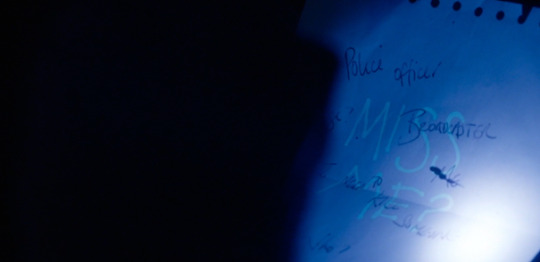
We know, that she has a real gun – no tranquilizer – and that she really shoots at John.

If we look at the position she is holding the gun, I assume that she hits John somewhere in the shoulder or chest, so he might be heavily injured. (Please not one of his beautiful eyes…!!!)

We hear the shot and see the move of the firing pin, see gun smoke, so the creators want to make sure that we believe that it was a real shot!

I’m convinced that Sherlock found John badly injured, after he got shot. John needs to tell Sherlock before he is fainting, that it was Sherlock’s sister ‘EURUS’ who shot him and about her disguise, because John is the only person, that knows her name at the end of TLD.

John getting shot and survives is cannon in ‘The adventure of the three Garridebs’ Sherlock is panicking and takes care of him ‘It was worth a wound, it was worth many wounds, to know the depth of loyalty and love which lay behind that cold mask." This is what John writes in ‘The Strand’ after he got shot in the leg in the original ACD story.
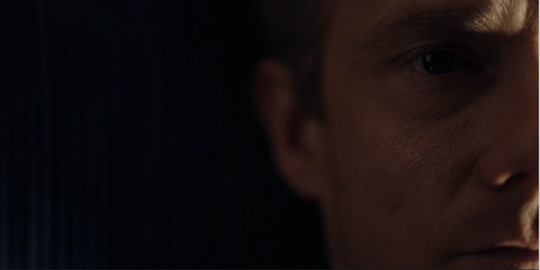
I don’t think that the writers will miss the opportunity to show us Sherlock suffering about John’s life!!!
Sherlock needs to find a way to save John, therefore he uses his mind palace, to find the answer. (I already did a post about that, TFP – is Mind Palace, Sherlock’s coming out’.)
TFP is completely mind palace. Sherlock uses EURUS as his mirror, putting him to all the tests, He needs to find out more about himself and to confront himself with all necessary questions. Look at her, she is the female Sherlock!
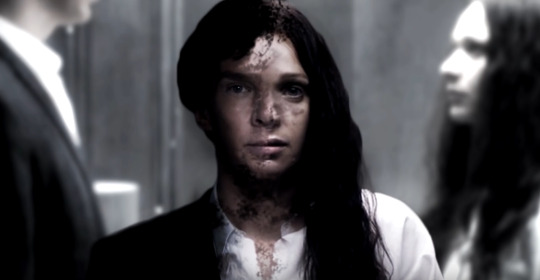
She has the same brown curled hair, blue eyes and is playing violin.
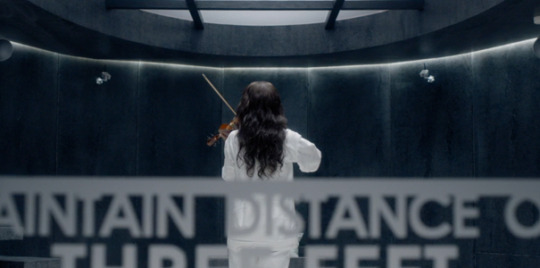
Villains are always introduced from there backside in Sherlock, like EURUS in her cell.

So just start to think about EURUS as a tool Sherlock needs to discover his own being in his mind palace, she represents his cold, calculating, reflected and violent side.
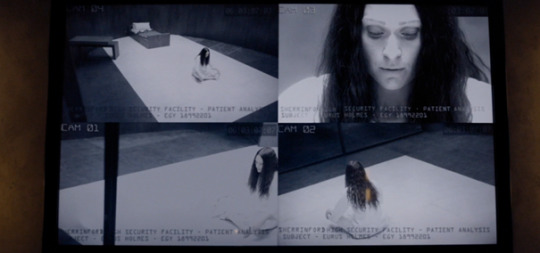
Just listen to the taped EURUS information’s: ‘Why am I here? No one ever tells me. Am I being punished?’
‘There is no such thing as bad. Good and bad are fairy tales (? It always comes back to this when Moriarty is involved!) we have evolved, we touch emotional significance of which it is nothing more than a survival strategy of the pack animal. We have the condition to invest stability and utility (‘utility was used by Mycroft in HLV to describe Sherlock). Good isn’t really good, evil isn’t really wrong, blossoms aren’t really pretty - you are a prisoner of your own meat!’ - ‘Why aren’t you?’
– ‘I’m too clever’ that is definitely Sherlock speaking of himself – pure mind!
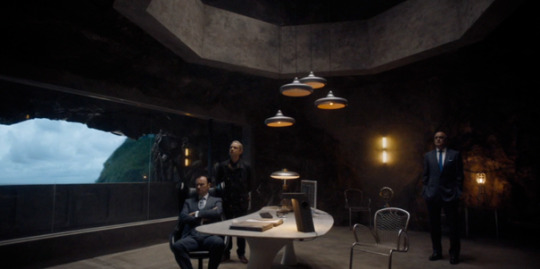
Remember: ‘Sentiment is a chemical defect, found on the losing side’ – Sherlock to Irene.
This is Sherlock’s moral code, how he had always seen the world, that he is too clever to be a prisoner of his own meat (heart). 100% brain without a heart, he is too clever to allow that emotions cloud his judgement- it is pure self-control and his protection.
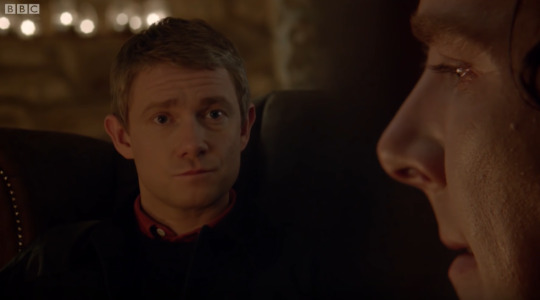
We can see him struggle with himself about this many times, e.g. at the fire place in the THoB ‘I need to distract myself from feelings.. it is the fly in the ointment. the crack in the lens.’ In the green house scene in TAB, he repeats that, etc.
Now he has his doubts, if this is the right strategy for live and for a good reason: He is in love with John and does not know how to express emotions, because he has never allowed himself to live through them before. So he needs to understand, needs to learn quickly.
So how can Sherlock who repressed his feelings his entire life learn to open up to John to let him see his warm heart behind his cold mask???
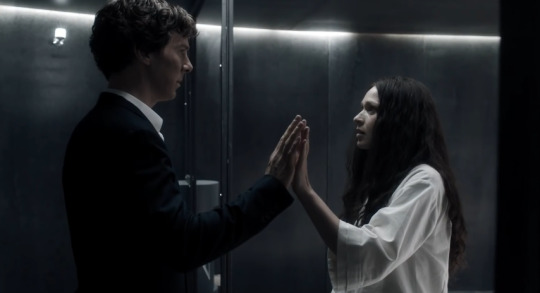
‘I am trying to help you. Helping someone is the best way you can help yourself.’ - EURUS in the taped information.
Sherlock solves cases - helping others is his strategy to help himself not to use drugs to cope with his isolation. But he hardly can accept to be surrounded by people, because he does not understand their feelings and is always insecure when they mention his lack of emotions. So he separated himself from his family, does not allow himself to have friends and is arrogant to all people around him to keep the distance, but this was going to change since John is in his life, he changed him, made it possible to open up a little bit.
Mycroft is the only family member that has regular contact with him. But Sherlock does not like his attention and surveillance, feels always in competition with his older brother. Mycroft pretended to worry about him constantly, but is cold, not a really loving brother figure. He monitors his mental state and Sherlock is somehow aware of that. He taught him this moral code once to protect Sherlock, but also protect his political career. Therefore he is reassuring, that Sherlock is observed, all the time.
But why? What is his motive? Maybe that Mycroft was remarkable, but if EURUS = Sherlock, he is incandescent, an era defining genius beyond Newton (?!?), clinically unique, was able to manipulate people since (S)he was 5 and is an adult now, so has now reached perfection in this.
Is Mycroft jealous or afraid? Is this the reason he needs to control his younger brother?

John is different, he is the only person that accepts Sherlock for who he is, who knows him for real, who completely cares. This is why Sherlock deeply cares about him - why he fell in love with him. John is selfless, does not judge, helps Sherlock to understand others around him and gives friendly advice when he was rude to someone without knowing. He saves him whenever necessary in every possible way, does not need to compete with him, kills a bad guy to protect him and is offering to die for Sherlock to protect him. John became Sherlock’s world, his new home – This for me represents pure love… (Without any sexual intention for now, only the longing, the fantasizing …)
So here we are again. Sherlock is at the fork of his path, he needs to find out, whom to follow in future, Mycroft (brain, calculating machine) or John (heart).
Stepping closer to the glass, EURUS tells him, that after REDBEARD (s)he could no longer feel the difference between laughing and crying. – So what happened, that was so life changing? – It must have been a real trauma, that changes a little kid like that…
Sherlock askes EURUS ‘Tell me what I don’t know.’ - ‘Touch the glass’
‘You are not used to being unsure… look at you, the man who sees trough everything is exactly the man that doesn’t notice, when there is nothing to see trough.’

There is no glass, there are no 2 different people… it is just Sherlock, he is in his mind prison, unable to escape. As the hands of Sherlock and EURUS touch, you can see, that he realizes that he is not confronted with his sister - he is confronted with himself.
EURUS is another part of his subconscious mind that knows everything, the hard drive is big enough to remember it all. It hits him and he is afraid because his subconscious mind is violent and attacks him, knocks him out – ‘Stop me killing him’.
EURUS = little girl on the plain = SHERLOCK
(Did some other posts on TFP before if you are interested, e.g. the little girl on the plain…)
Some things support this theory, e.g. there is no photo showing little EURUS in his mind palest after he is informed that she existed, no sign of her in Mycroft’s family movie…) She is not real!!! (Everything else is transport…)

When Sherlock got knocked down by EURUS, in parallel the complete prison is under alert (so clearly mind palace) – and the devil, the virus in the data (Moriarty) resurface, but most of the time as an image. Sherlock was always afraid of Moriarty, that’s why he did not allow himself to have feelings for John. When dream John realizes the voice, he is knocked out, too in parallel.
#tjlc is real#tjlc explained#tjlc is canon#tjlc meta#tjlc#tfp#tfp spoilers#sherlock#bbc sherlock#sherlock bbc#johnlock#rouge#@jenna221b
126 notes
·
View notes
Text
Okay, we need to talk about John...
Absolutely full respect and compassion to everyone who felt triggered by what John did to Sherlock in TLD. I can understand why you’re upset and why you are wondering if John is still a good guy or if he crossed a line that can’t be uncrossed.
Below the cut, I’m going to take a look at it from a literary, story-telling perspective, so if that’s going to be too spoilery, too triggering, or too infuriating for you, might want to skip this one.
I’m approaching this strictly as story. Story is there to help us make sense of the real world, to serve as an emotional release, to inspire, to warn, to help us explore ideas, etc.
But it is not supposed to be the same as real life. Story is better structured, more purposeful, and more deliberate than real life. It’s also more heightened and larger-than-life.
So none of the below is meant to be taken as justification of real-life violence. This is story.
I can’t tell you for sure why Moffat chose to have John beat up on Sherlock. And I’m not going to say it was necessarily the right choice—it's art. Declaring an artistic choice to be right or wrong is very subjective and I’m not asking anyone to like the choice he made.
But I do have some guesses based on literary devices and structure of why he went that direction, so I thought I’d share those with you—and then you can feel about it as you wish.
First, story structure:
I’ve discussed story structure in relation to Sherlock before, on my website, and I don’t think I’ve ever transferred those meta to Tumblr yet.
But basically, there is a set structure to telling a story that most filmmakers (and Sherlock episodes are approached as films) use because it works the best for the audience. And because Sherlock episodes contain an ongoing story arc, we can also apply that same structure to the show as a whole, with S4 (instead of S5) bringing this story arc to a close.
You can read my meta on that here (I assumed a 5-series arc instead of 4), but the relevant part for TLD is that we’re well past the half-way point, which was the vow Sherlock made at the wedding.
That greater commitment he made must be tested, and immediately after, he was plunged into more complications and higher stakes.
At some point in all this testing and higher tension, the hero breaks or seems to have completely failed. This is called the Dark Moment, or Major Setback, or other similar term.
The dark moment or major setback began with John rejecting Sherlock. I believe it culminated in John beating the crap out of Sherlock, and then saying goodbye at the hospital.
The dark moment is, as it says on the tin, the bleakest, lowest point in the story. And the deeper you make that abyss, the more rewarding the story will be when the hero finally succeeds.
One of my favorite writing teachers has the mantra “How can you make this matter MORE?” So many writers tend to pull back, to go easy on their characters. That lowers the tension of the story, it makes the story less impactful. A good story—no matter if it is a quiet, slice-of-life story or a high-octane adventure story—pushes its characters to the breaking point.
What is the one thing this character would never do, think, or say? Put them into a position where they must do, say, or think exactly that. —Another common advice from the same writing teacher.
Basically, the Dark Moment should be as dark as you can possibly go within the plausibility of your story. There’s a 10 Commandments of Storytelling list from the author of The Princess Bride going around, and one of the commandments is pretty much exactly this.
Because this is ultimately a relationship story between John and Sherlock (and it is—whether or not that relationship becomes romantic or not, the structure is exactly the same), at the Major Setback, they had to “break up.” I warned about this in my meta and here on Tumblr.
And it had to be John walking away. Utterly rejecting Sherlock. That’s how a romance structure works. It’s not meant to be realistic, necessarily. It’s meant to show how the hero and the love interest transcend all odds to find their way back to each other.
Low stakes in a story are boring. We always say we just want them to be happy. And I think that fluffy, happy fic serves a lovely and good purpose. But an actual TV show that lacks the necessary tension and emotional lows and only gives the emotional highs gets boring.
It’s cliche, but you do need the bad to appreciate the good—in a story.
I believe Moffat chose to have John beat up Sherlock because it reaches a lower and darker dramatic point than merely having him reject Sherlock or stop talking to him. He rejected and stopped talking to Mary—his “break up” with Sherlock needed to be bigger and worse and more heartbreaking than that because he and Sherlock are the primary relationship in the show.
Did that HAVE to include violence? Mmm…perhaps not. But other options would have been yelling horrible things at him. Refusing to see him. …I’m not sure what else.
John refusing to see Sherlock kind of prevents the story moving forward. There needed to be a confrontation. Something utterly rock bottom. That way, the reconciliation would be more powerful.
Yelling horrible things at Sherlock would not be as visually interesting as having him “yell with his fists.” Moffat is a screenwriter—a visual storyteller. Given the choice, he’s probably going to pick visuals when he can.
So, they hit rock bottom, but ultimately, John’s better self prevails and there is a beautiful, poignant reconciliation.
You are not likely to see the beating addressed in any meaningful way in the show because immediately after the Dark Moment comes the Final Push—the all-out last-ditch effort for survival and to, in this case, beat the bad guy.
Working out John’s physical aggression and anger problems is low tension. It doesn’t add to the high stakes and action that is coming in TFP. They are going to have to fight, together, to beat the bad guy in order to earn their happy ending together.
And I do firmly believe it will be together. Whether that’s romantic together or platonic together, I don’t know. But the story is about the two of them, always, so obviously the story will end with the two of them happy and together.
But it’s unlikely that the show is going to have them address the beating in any real-life way because it doesn’t fit into this part of the story arc. We got a sense of John’s regret in his interrogation with Lestrade and in his discussion with Sherlock at the end of the episode. I’m pretty sure that’s all we’re going to get.
What About John’s Character? Was this OOC?
Not at all. The Dr. Watson of ACD is quite a bit different than the John Watson of BBC Sherlock. Our John has always had a simmering anger about him. He’s always been physical—in good ways and bad. He’s always been a man of action, and not so good with spoken words.
If he was to reach his breaking point, of course it was going to be physical and violent. Again, I’m not saying this is good. It’s not. But he’s never been a saint.
Larger Than Life:
Another aspect of storytelling is that you need your characters to have a heightened reality, a larger-than-life quality. Ultra realistic, mundane characters are boring.
But you also need some sense of emotional authenticity in order to make these larger-than-life characters relatable to the audience.
This plays out in the way you choose to have your characters express their emotions. It’s not that you try to replicate real life, exactly. In a story, you try to grapple honestly with the experience of being human, but you do it in a way that magnifies it, draws attention to it, and creates an emotional response in the viewer.
In John’s case, the point was to explore the ripping, violent, overwhelming emotions that come with experiencing a tragic loss, especially one that left loose ends and lingering guilt. The beating was a visceral, visual representation of those emotions. Yes, Moffat could have used words, facial expressions, tone, and Martin Freeman would have done a great job with it.
But a violent confrontation, as awful as it is, represented those deep, wordless emotions far more effectively than dialogue or other non-verbals would have.
It’s not meant to be taken as real life. The emotions, yes, absolutely authentic and real. But the violence—it was a way for the audience to visualize those emotions.
I don’t think they will handle the aftermath of it “realistically” in the show, and I don’t think we are meant to view it “realistically” either.
I’m sure that’s going to be a controversial idea. And there’s definitely a conversation to be had about how toxic masculinity denies a man any emotional expression other than anger.
But I really don’t think Moffat chose the beating because he’s a violent person or enjoys violence or feels like that’s the only way for a man to express himself.
I think it was an artistic choice based on the John Watson they created for this show and based on what would fit the narrative structure and be the best way to visually portray John’s emotions. Whether it was the best artistic choice is a fair debate--I’m not honestly sure I would have made the same creative choice in my writing. I don’t know what I would alternately have done, either.
What I did love, that balanced out all that ugliness, was when John, in the end, managed to express his emotions and grieve in a way that allowed Sherlock to comfort him. That was healing, that was beautiful. And it sent a clear message that violence wasn’t cathartic, it didn’t make anything better.
What made it better, was love and gentleness, forgiveness.
#bbc sherlock#tld#meta#spoilers#John Watson#portrayal of violence on TV#story structure#creative choices
85 notes
·
View notes
Text
Time to lay some ghosts
Think only of the past as its remembrance gives you pleasure.
- Elizabeth (Bennet) Darcy in Pride & Prejudice
[Disclaimer: Though far from my usual content, this is not an anti-Johnlock post, and it is not informed by TFP spoilers. It’s also not the new normal for my blog: we’ll be back to gifs and stupid jokes soon.]
I want to enjoy the possible last episode of my favorite show, and that means letting go of some expectations. This is largely a personal post that I’m writing to clarify my own thoughts and prepare mentally for TFP, but perhaps it may also help anyone who is dealing with shaken assumptions and unwanted or unexpected developments from T6T & TLD. If it does, then I’ll be glad. Anyone can feel free to reach out at any time with questions or just to talk about the show. I joined this fandom to engage with people, and I’m entering a strange interval where I have unusually minimal real-life obligations.
This post has two parts. Part one: notes on some specific theories that I’m finally rejecting post-TLD. Part two: thought process and personal attitude, for context. Skip part two if you don’t care - unless part one pisses you off, in which case I’d appreciate the chance to explain myself. That is, if anyone reads any of it at all. ;) All under the cut.
And yes, I realize many fans are well beyond this point mentally and emotionally:
Well, Watson, we can but possess our souls in patience and see what the hour may bring.
- Sherlock Holmes in The Adventure of the Three Garridebs
Conclusion: Bring it on, dads. You’re still pretty cool. Just don’t embarrass me unforgivably.
Or, if you’re indeed about to jump the shark, please do it at the climax of an epic jet-ski chase, replete with risk, loyalty, danger, hair dye, big coats, romance, gorgeous smiles, splashy effects, lame puns, excessive guns blazing, and impossible physics amazing. Well, you’ve promised the first few, anyway.
The ghosts I am laying to rest
Context: I am hiding from spoilers from the TFP screening (and apparently the Russian leak, WTF), so I don’t know as much as others right now, including what’s been confirmed or not. A bit of mood has filtered through from my activity feed (e.g no one’s laughing at Eurus jokes, or laughing much at all, or engaging with vague new theories). But I can’t draw specific conclusions from that, and otherwise I have no idea.
Knowing the nature of most of my followers, let me start by saying that I consider all of these theories to be logically separate from the basic possibility of canon Johnlock. I know some people feel differently, and have more elaborate theories that depend on certain characters being revealed in certain ways, etc. I won’t write “why Johnlock could still happen” for each item below. In general, it’s just this: it can be simpler than that, and still work. A hundred thousand fanfics have proven that. As a reminder, I am not a committed TJLC believer, though that’s not saying much, as I’m skeptical of everything - see part two for explanation.
I have flirted with these theories to varying degrees, but never actually invited them out for a foot chase or Chinese food. Most I’ve never even mentioned on here, primarily for lack of time, for coming too late to the fandom, or because I had nothing unique to add. So my comments in dismissing them are accordingly brief, and may come across as blunt. In all cases I’d be at least intrigued to be wrong - and knowing our writers, most likely pleasantly surprised as well.
Mary: She’s dead. This was part of the consequences we were promised for Sherlock and John’s insane lifestyle. And as awkward as the death scene was, John’s grief in the moment and throughout TLD was real. I’m letting her rest in peace. That includes leaving her murder case closed. It was shocking (in part for not being shocking enough), but was heralded adequately by the episode, the creators, and television history.
Mary as villain, Moriarty associate, etc.: Speaking of peace, there is by now plenty of textual evidence for Mary as a sympathetic character. The evidence for her villainy remains subtextual or subject to interpretation, and the challenges to her personality were always emotionally charged. As I’ve said elsewhere, the explanation given by the show for her shooting Sherlock is entirely acceptable within the show’s established boundaries. Even as a temporary romantic obstacle in a romance, she still wouldn’t qualify as a villain.
Anti-Johnlockary friendship: This is closely related to the above. Sherlock genuinely liked Mary, valued her judgment, and wanted John to be happy with her. This was clearly shown both textually and subtextually in TSoT and T6T. In T6T when he was anticipating his death, he may have even hoped that she would pick up where he left off, after. Her importance to John can’t be made clearer than in TLD. Meanwhile her advice to Sherlock in that episode is not really more ridiculous than what Sherlock did to himself the day after he met John Watson. The teasing between the three of them is pretty typical of mature, clever, close friends, in my experience.
Lazarus was false: The creators have said on a few occasions that they wished they had been as clever as the fans. Perhaps this is one case of it. But in the end, they wrote a television ending for a television show. Again, it’s acceptable within the show’s established boundaries. And after they dug up the characters’ feelings again but not the details of the act, I’m convinced the Lazarus explanation did indeed survive the fall (and the hiatuses).
Sherlock has been depressed and dabbling in drugs since TEH, and his increasingly elaborate mind palace sequences are the result: My own theory, though not something I’m desperately attached to. Now that I’ve definitely seen Sherlock deducing on drugs, it’s clear the writers were just having fun with their own trope, previously.
Continuity errors, set choices, and plot holes indicate T6T and TLD are not real: My immediate instinct with T6T was reliable narrator, at least to the extent that Sherlock is capable of it. Without adopting preconceptions based on other theories, that remains the most fitting explanation. The twists in this episode were not as deep as usual, perhaps because the show had an extra agenda of “consequences” to communicate. The housekeeping episodes are always a bit of a mess, anyway. As for TLD, we now have textual examples of how the creators handle drug-induced hallucination and memory distortion. We have the first serious misfortune contemplated by the show as well as massive character development in the span of these two episodes. Audiences would not accept their reversal, and the writers knew and intended this when writing. cf bullets below for opinions on the potential “mistakes”.
EMP or any other (TD12 etc.) massive retcon/rehash stretching into previous seasons: They wrote “it was all a dream” once, and even then, Sue and Benedict were hesitant to sign on, critics were unimpressed, and some casual fans were alienated. Even with 26 pages of dialogue between Mycroft and Sherlock in TFP, with flashbacks throughout, it wouldn’t be possible to go back and re-interpret major events from multiple seasons. The questions raised in T6T and TLD alone will be difficult to address in just one episode (because there’s still whatever new plot they devised, as well). In the end, there’s also the simplest question: why would you want this now? We have enough character development, enough beautiful moments, and enough mind-fuckery to be going on with.
Adlock as a central focus: This isn’t a popular theory, but it may be a common if unacknowledged fear. The way Irene’s re-introduction in TLD was handled - as leverage for a scene about John and Sherlock’s friendship - makes me confident that anything further to do with her would be sideplot, comic relief, or tension release at best. But (branching into pure speculation here) based on what the writers have said in the past, I think it most likely she’ll remain a mysterious yet absent symbol of the ambiguity that defines part of Sherlock’s appeal.
Mega flashbacks of Johnlock scenes: Honestly I’ve never really been on board with this. The fact that the creators have had to remount expensive scenes like the fall and the tarmac for subsequent seasons proves that they just don’t plan this far ahead when writing and shooting. In any case, logistically, there is simply not time to fit it in now.
Finally, the one that hurts the most. Johnlock as television history / groundbreaking representation: If they’re not doing Johnlock, they’re doing it wrong. But unfortunately, if they’re doing Johnlock, they’re also doing it wrong. All the metas about romantic character arcs, slow burn, and audience manipulation to combat heteronormativity were absolutely right. Series 4 was the time to draw this story together, or at least to build it to its climax. At this point, a S4 Johnlock resolution would have to be addressed so quickly (because there’s so much else to address already in TFP), it would blindside casual fans, not convince them that it’s what they were seeing all along. It would come across as one more rug pull, and would be derided with all the vitriol that this fandom has been intercepting in the meantime. We didn’t join this game only to be met with a moving or shrinking target. Could they still do it in series 5? Maybe. They introduced enough estrangement and other darkness that delaying relationship progression now makes actual emotional sense. But the show is at its peak influence right now, they’ve never been assured of a 5th series, and the writers have admitted that their plans for series 5 amount to little more than notes. Canon Johnlock is possible, but I think they’ve missed their chance to make history with it.
How I got here
None of you know me personally, and I almost never post this type of thing. So if anyone’s reading it, some background is called for. Let’s start with the impersonal bit, which you might have a chance of relating to.
As a television audience, we have to draw a line: where do we suspend disbelief? Some shows make this decision easy, but Sherlock makes it nearly impossible. We either draw the line generously, redraw it constantly, or commit to endless (fun?) mental anguish. In defense of generosity, and to avoid the disappointment and evasion of declaring it all “bad writing”, it’s important to keep these facts in mind:
The show is written by committee, pass-the-pen style, so inconsistencies in characterizations and plot logic are bound to occur, even with the head writers vetting everything.
The writers’ commitment to shocking rug pulls and the attendant necessity of obsessive secret-keeping mean that some writing choices exist in a critical vacuum, unexamined and un-analyzed except by the core creators. Market research is impossible here, and history illustrates the many potential pitfalls of this approach.
The show’s influence is outsize and its quality is tremendous in comparison to its relatively tiny budget and production team. We ARE watching low-budget network television, so expectations need to align.
The fandom vastly outnumbers the production crew, and vastly outspends it in both (re)creative and analytic effort, so we’re bound to catch more details than they do.
Some members of fandom also vastly exceed the creators in cleverness and creativity. I’m constantly astounded by the intelligence, imagination, and critical capacity of the fans, and between you and me, that is saying something. Our creators are clever and imaginative, but they’ve got nothing on some of you.
At the core of that production team is a nepotistic hive mind. It’s not nice, but it’s true. There is definitely a virtuous circle, a positive feedback loop, going on. Part of this is borne of the secret-keeping, part of the low budget, and part of the usual human tendencies to value our own, to seek comfort, and to submit to confirmation bias.
The writers and actors have admitted to not fully developing backstories before jumping into the scripts [BC] [AA]. I actually thought Benedict must have been lying in that NPR interview (or trying to wind Steven up) when I first read it, but later interviews have confirmed it. Our best fanfic writers take backstory more seriously than this, so we should expect OOC moments.
The writers don’t often use consultants, even where they obviously should and easily could. Plenty of unnecessary mistakes happen when you don’t ask for help.
Various breaks in the show’s own internal logic suggest that the writers also didn’t bother to map this out fully before they began. They firmly believe that Sherlock “exists in a slightly exaggerated version of our own universe“, so they make assumptions accordingly. Except, obviously there are huge differences between the Sherlock universe and the real world. They simply go unacknowledged, with little or no explanation offered to help fans make sense of them. We’re meant to let them pass unhindered over our suspension lines. Rowling’s or Tolkien’s meticulously-planned fantasy world this is not.
Our creators are nonetheless at the top of their crafts, producing an entertainment product that never fails to be unique, surprising, visually stunning, mentally engaging, and emotionally wrenching. The original reason we (most of us) are here is still this amazing show.
And now for the personal part. First, it’s my policy to let entertainment enhance my life, but never to ruin it. If that sounds flippant, know that it’s something of a self-preservation tactic: part of managing a tendency to depression. It’s also my policy to believe nothing without proof. I’m heavily influenced by scientific skepticism, and prefer “reliable and valid [conclusions] to ones that are comforting or convenient”. That makes me an extreme outlier among humans, let along among conspirators, which is why I say that my non-belief in TJLC has little bearing on anything. Theory-wise, I don’t have a lot of chips on the table - most of mine are partly crack or lightly researched. I do have personal investment in queer representation in media. I even have a little bit of money on the table for this show. But not all my eggs are in this basket: I’ve always believed that it’s a larger battle than this one show can wage (again, self-preservation).
As for enhancing my life, I had a blast watching TLD. But I was strung out, panicked, and somewhat disengaged watching T6T. The quality of writing and nature of the episodes can partly account for it, but when I examine my own mind, I know that a huge part of that was expectations. I came to TLD after a week of overwhelming work obligations. I’d had to abstain from the fandom, had missed nearly all the theories and analysis, and brought mainly my own impressions of T6T with me. By contrast, I came to T6T fully steeped in fandom culture and theory (mostly TJLC), having spent a shocking fraction of my December devouring meta, analyzing promo material, making a fanvid, rewatching multiple times, and even leaking a bit of content. My first impression was “difficult to engage with”, and I was constantly distracted with thoughts of the fandom - this despite the fact that I usually have no problem forgetting outside life while I’m consuming entertainment. It was depressing, and literally for my own sake, I can’t afford to get depressed.
The simple explanation is that my expectations were too high and too specific. In a brief career in corporate America that included marketing work, I learned that the key to avoiding failure in almost any human interaction is managing expectations. Cynical, but true. It’s a valuable life lesson, though, and one that I guess I am lucky to have learned so early. I am now something of a career traveler, and the same truth holds: when I travel to a new place for the first time with sketchy plans and low expectations, I never fail to be amazed. High expectations frequently result in disappointment. I do know to apply this truth to entertainment consumption, as well, but I was a little swept away in the fervor pre-T6T. I’m trying not to make that mistake again.
The name of my blog is meant to represent how I engage with this show, and indeed with everything. Challenging my own perspective frequently and rigorously is important to my worldview and self-worth. Quotes to live by include “the un-examined life is not worth living”, “an echo chamber is a reassuring womb but no place to live”, and “the surest way to corrupt a youth is to teach him to hold in higher regard those who think alike than those who think differently” (paraphrased, you can Google ‘em). I pursue multiple interpretations (roads) simultaneously, compartmentalizing to avoid cognitive dissonance. The demons beneath are the perils of committing to any one path without justification: dangerous to theorize without data and all that.
Over the years, so few fan theories have been borne out by the show. That’s not any kind of shade on fandom. If anything, it proves how wondrous and limitless is human imagination. I’ve enjoyed reading theories so much, I wonder if there is anything to do with Sherlock, or indeed anything nerdy under the sun, that wouldn’t entertain me. (Yes, I used to read the dictionary as a child.) But Moftiss have shown time and again that their idea of a great television story is simpler, more traditional, and more worthy of an old white man than what the fandom tends to imagine. So I’m taking them at their word for most of the previous episodes, and resetting my expectations in hopes of at least being entertained, if not validated and delighted, by tomorrow’s episode.
(Actual conclusion is outside the cut, above.)
0 notes